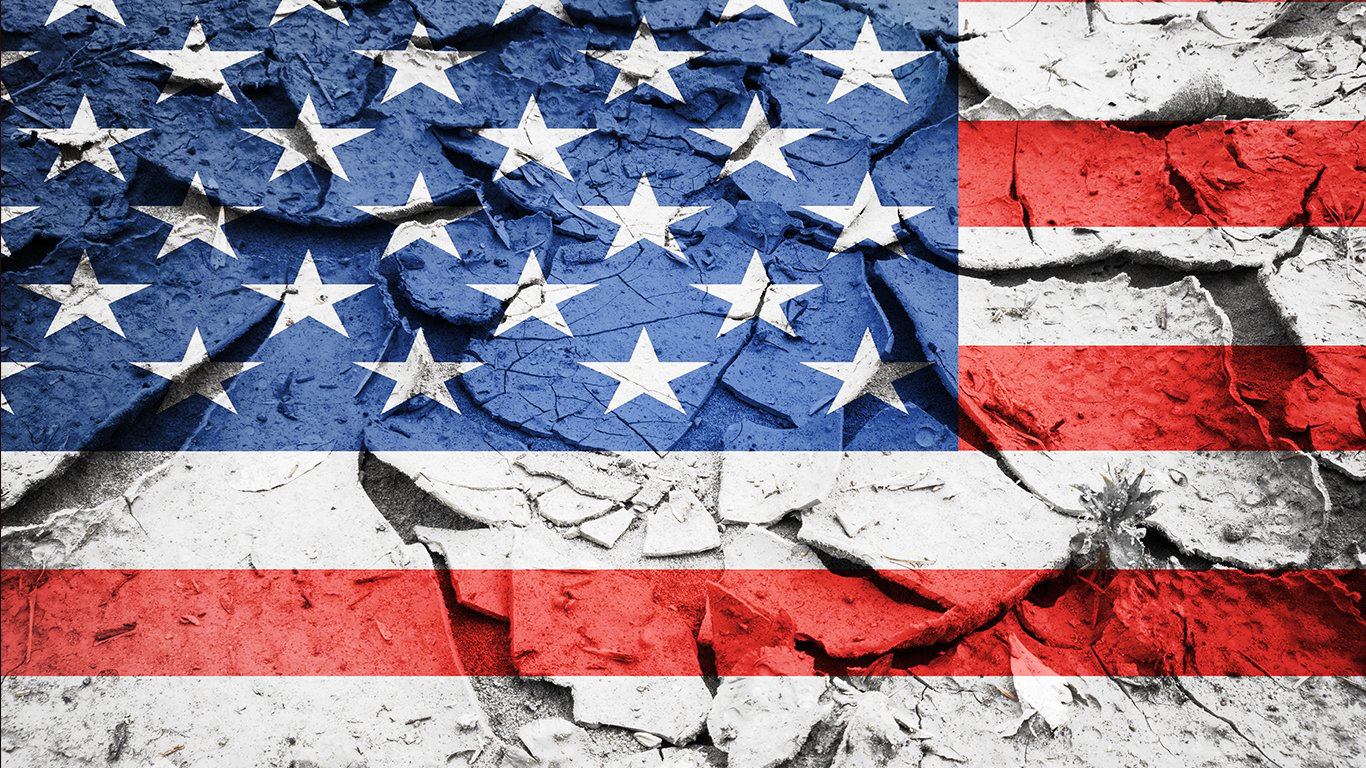

As the United States grew from 13 colonies to 50 states, each state has developed its own identity, full of culture, cuisine, and state pride. Yet each state, no matter how nice it may seem, has at least one major drawback.
These drawbacks may be obvious ones — like the lowest income, highest violent crime rate, or highest rate of obesity — or they may be less obvious, like the lack of early educational opportunities or high per capita credit card debt.
24/7 Wall St. reviewed facts and figures from various sources about all 50 states to determine the worst statistic about each state.
Some states are victims of their geographic location, being constantly pummeled by blizzards, tornadoes, or hurricanes. Others have systemic issues among their citizens that can lead to violence, poor health, and poverty. Problems in some states can be traced back to their governments, such as low levels of educational spending or crumbling infrastructure.
Click here to see the worst statistic about your state.
To determine the worst statistic about each state, 24/7 Wall St. reviewed a number of government and media sources to find one negative statistical attribute in each state that leads the nation.

Alabama: 84.8
Alabama has fewer than 85 mental health providers per 100,000 people, the least of any state and well below the national average of 212.8 mental health providers per 100,000 people.
[in-text-ad]

Alaska: 7.2%
Alaska’s annual unemployment rate of 7.2% is the highest of any U.S. state and a full percentage point above New Mexico, the state with the second highest unemployment rate.
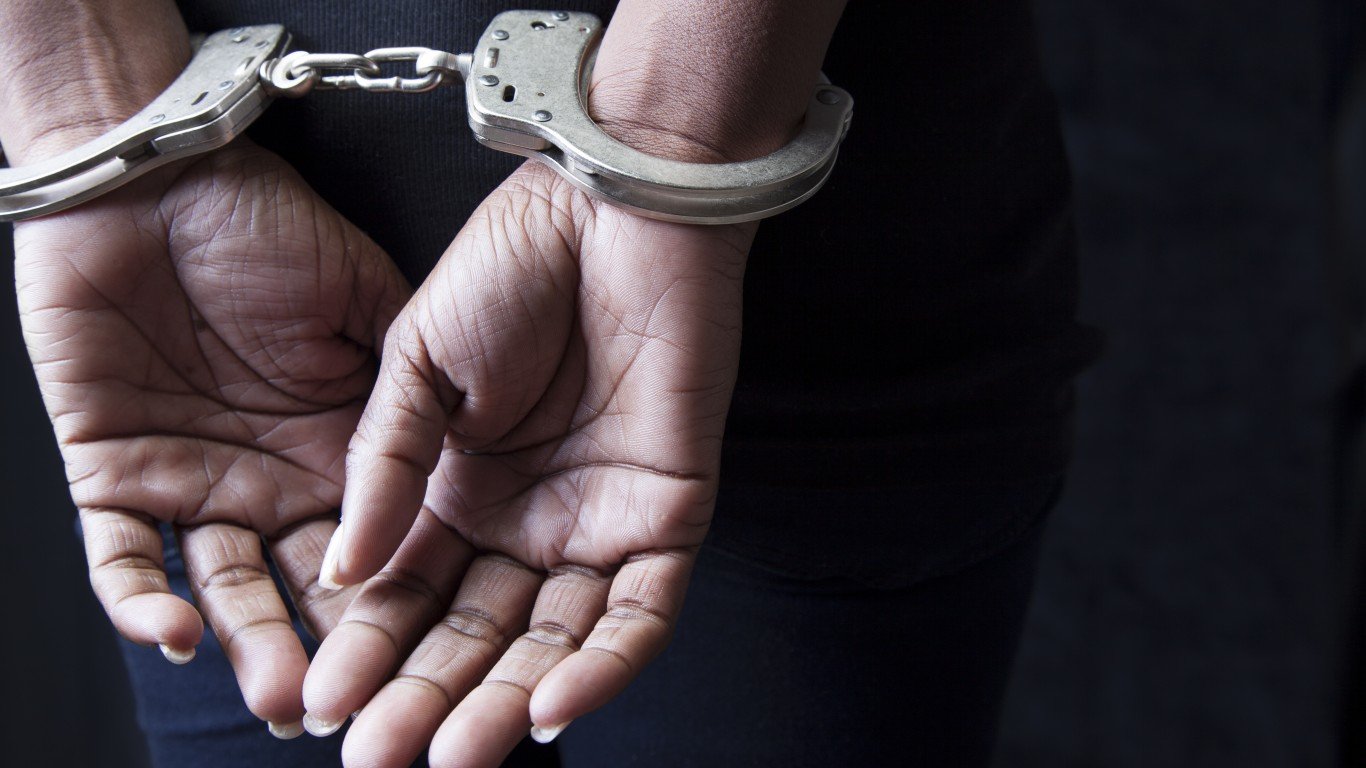
Arizona: 800 per 100,000
For every 100,000 Hispanic residents in Arizona, 800 are incarcerated, more than seven times the national average.

Arkansas: 24.5%
Nearly a quarter of state adults report having fair or poor health, compared to 16.0% of Americans.
[in-text-ad-2]
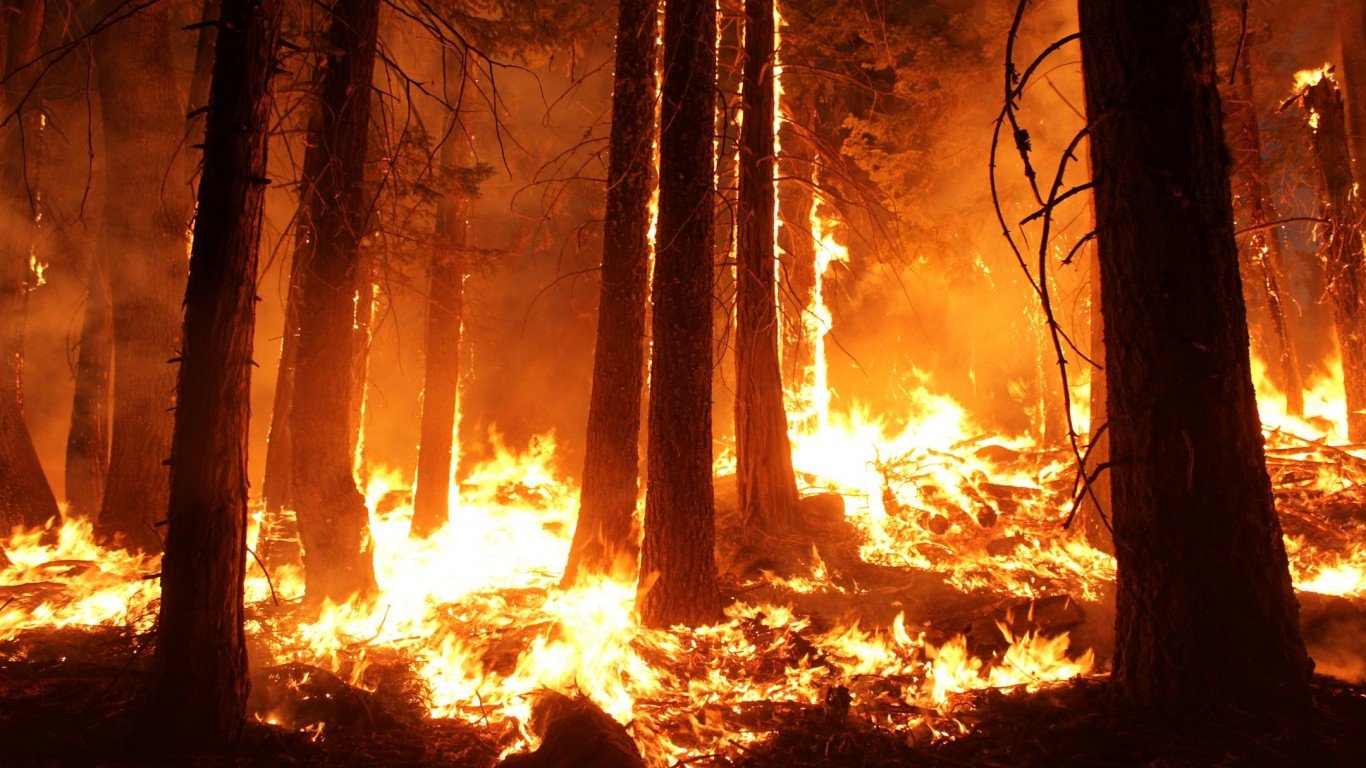
California: 6.7 million acres
Between 2008 and 2017, 6.7 million acres of land in California burned in unplanned wildfires, the second most in the contiguous United States. While statistics have not been released yet, 2018 appears to have been one of the worst wildfire seasons in state history.

Colorado: 31%
In Colorado, just 14.6% of Hispanic adults graduated college, less than a third of the white college degree attainment rate, which is 45.6%.
[in-text-ad]

Connecticut: $7,258
The average debt for bank-issued credit cards in Connecticut is $7,258, the highest of any of the lower 48 states (Alaska has even higher credit card debt).
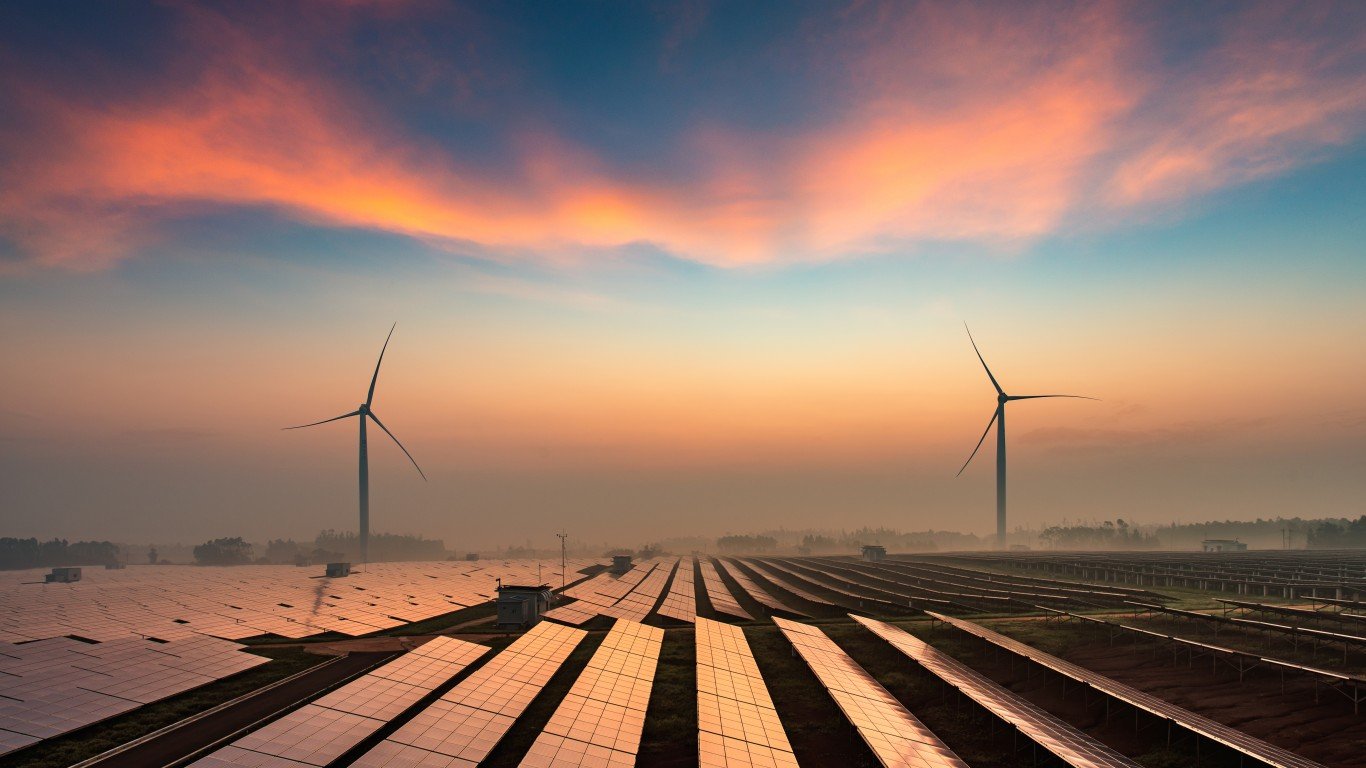
Delaware: 2.4%
Just 2.4% of the energy used in Delaware comes from renewable sources, one of the lowest shares of any U.S. state. Nationally, 11.7% of energy production comes from renewable non-hydro sources.
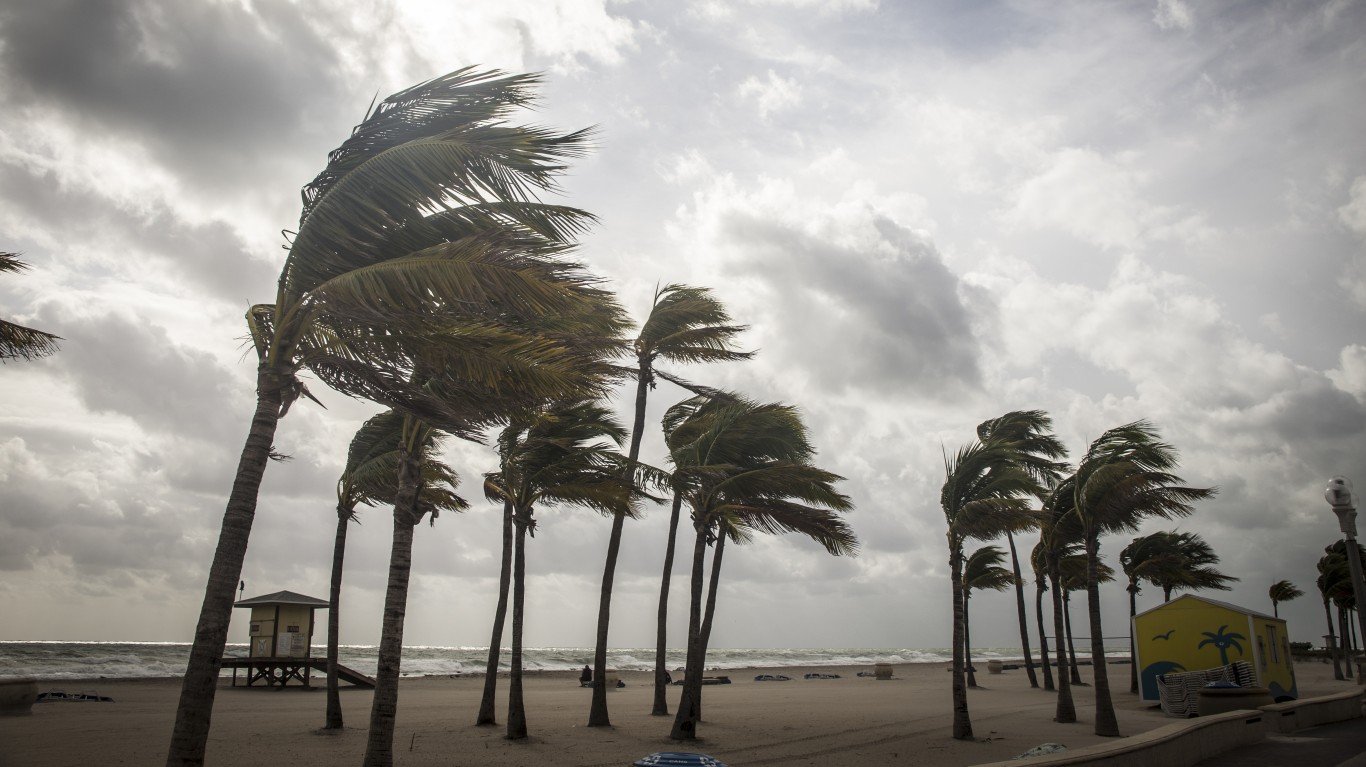
Florida: 120 direct hits
Due to its location relative to the Atlantic Ocean, Florida has been slammed by 120 hurricanes since 1851. Texas is next with 64.
[in-text-ad-2]
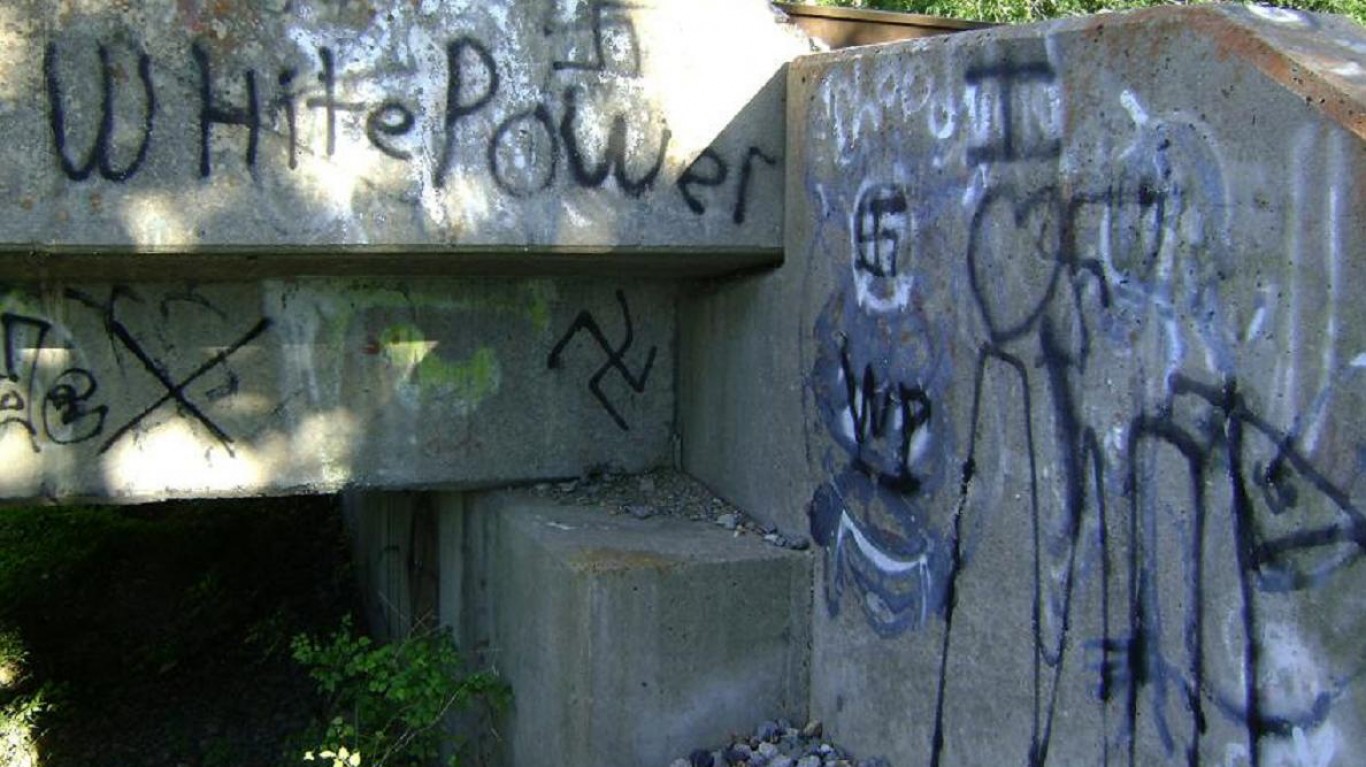
Georgia: 40
According to the Southern Poverty Law Center, Georgia has 40 hate groups, including multiple chapters of the Ku Klux Klan, neo-Nazis, and Skinheads.

Hawaii: 18.4%
As a result of its remote location relative to the rest of the United States, the cost of living in Hawaii is 18.4% higher than the average cost of living nationwide.
[in-text-ad]

Idaho: 30.6%
Just 30.6% of Idaho’s 3 and 4 year olds are enrolled in preschool, the lowest share of any state and less than half the share in states like New Jersey and Connecticut.

Illinois: $244 billion
Illinois has long struggled with debt levels that put it at risk of a serious financial crisis or even bankruptcy. In its most recent fiscal year with available data, the state had $244.9 billion in obligations and just $28.8 billion in assets.

Indiana: $141,100
Indiana homes are some of the least valuable in the nation as most are worth less than $142,000. The typical home nationwide is worth $217,600. This may indicate that the state is one of the less desirable states to live.
[in-text-ad-2]

Iowa: +46%
Iowa is a relatively peaceful state, but it recently had a spike of 46% in homicides, the largest increase of any state. Even with the increase, however, the state’s murder rate is below average.
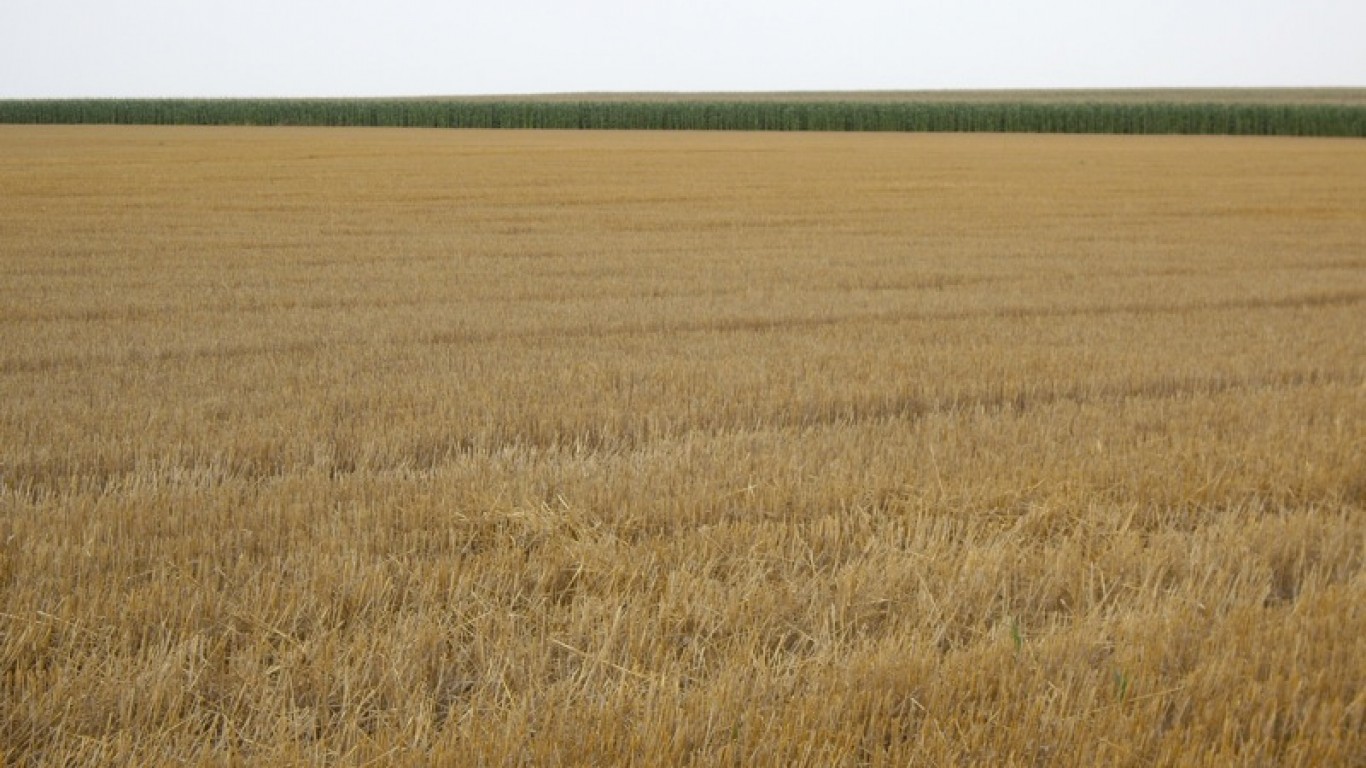
Kansas: 4.6%
The rate of larceny and theft in America became less common in the last year, but not in Kansas. The state had a U.S.-high increase of 4.6 percentage points in its larceny and theft rate.
[in-text-ad]

Kentucky: 76.56 per 100,000
Preventable hospitalizations are a sign of poor health habits and a suboptimal medical system. Kentucky has an estimated 76.56 preventable hospitalizations per 100,000 Medicare enrollees, the highest of any state.

Louisiana: 12.42 per 100,000 people
Louisiana has among the highest rates of several violent and nonviolent crimes. Specifically, there were 12.4 homicides in the state in 2017 per 100,000 residents. This nation-worst murder rate is partially driven by New Orleans’ homicide rate of 39.5 per 100,000.

Maine: 32.7 per 100
Maine’s old age dependency ratio of 32.7 retirement age adults for every 100 working age adults is nearly the highest of any state. A high old-age dependency ratio typically means slower economic growth and Maine is now offering student debt relief to qualifying college graduates who chose to live and work in the state.
[in-text-ad-2]
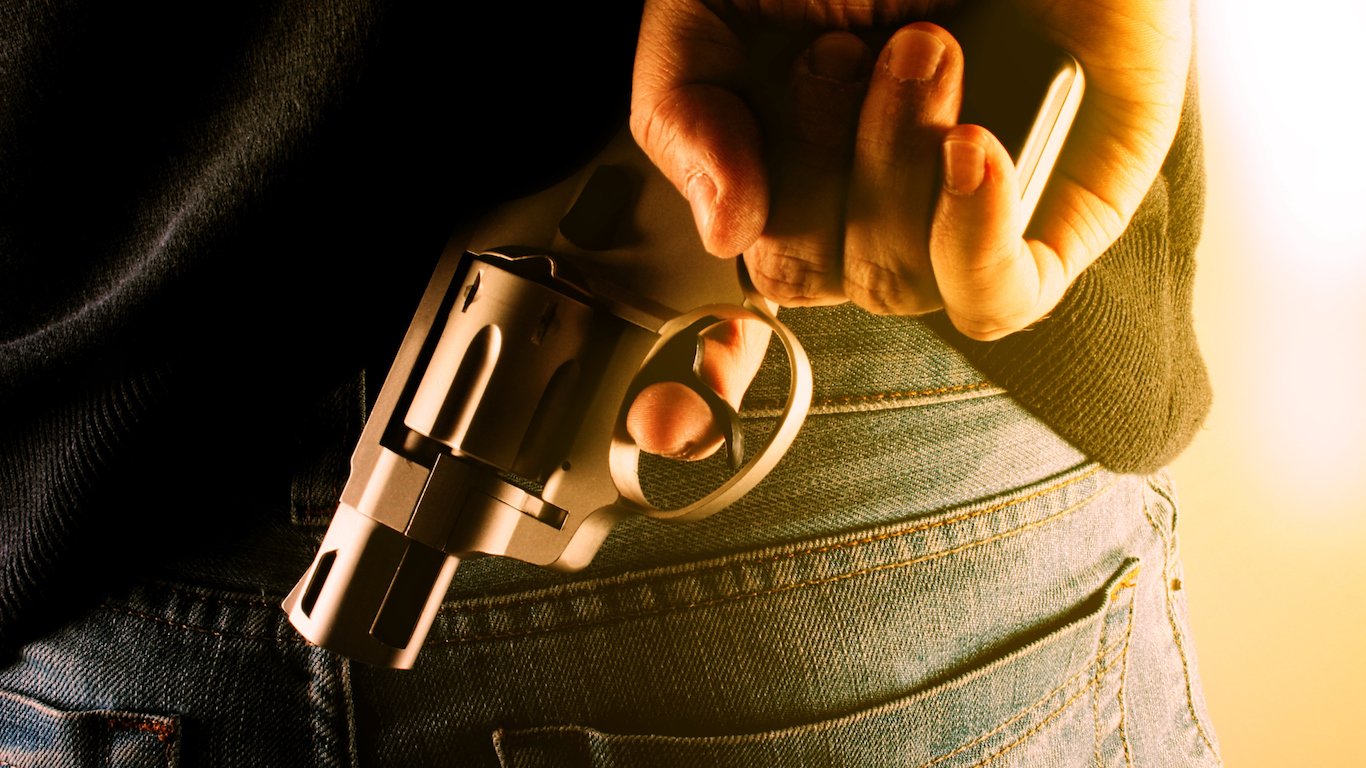
Maryland: 185 per 100,000
Maryland has the highest rate of robbery of any U.S. state, at 185 reported incidents per 100,000 residents. For comparison, the U.S. robbery rate is 98 per 100,000.
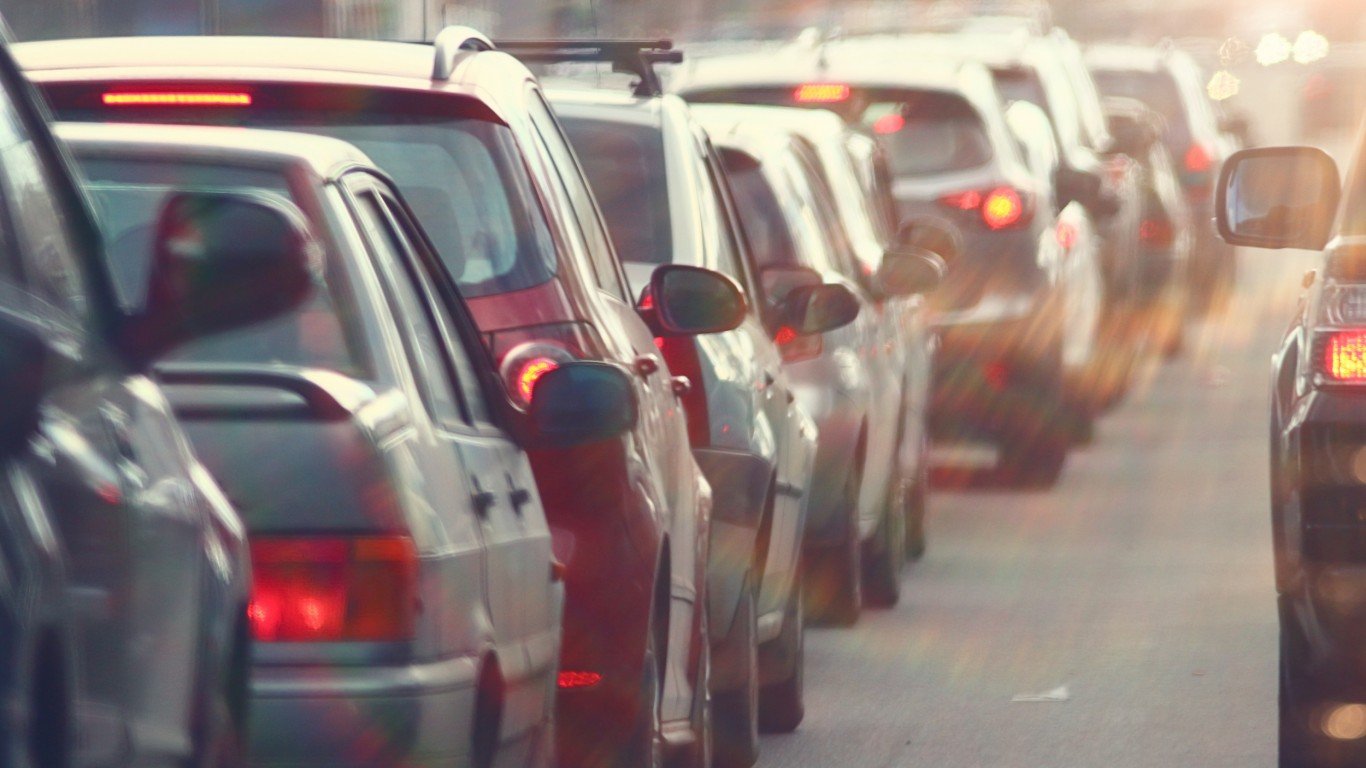
Massachusetts: 41.9%
Nearly 42% of Massachusetts commuters drive at least half an hour to work alone, one of the longest shares of any state. Nationwide, 35% of commuters drive to work alone for at least 30 minutes. These long commutes are bad for the environment as well as the commuters themselves.
[in-text-ad]
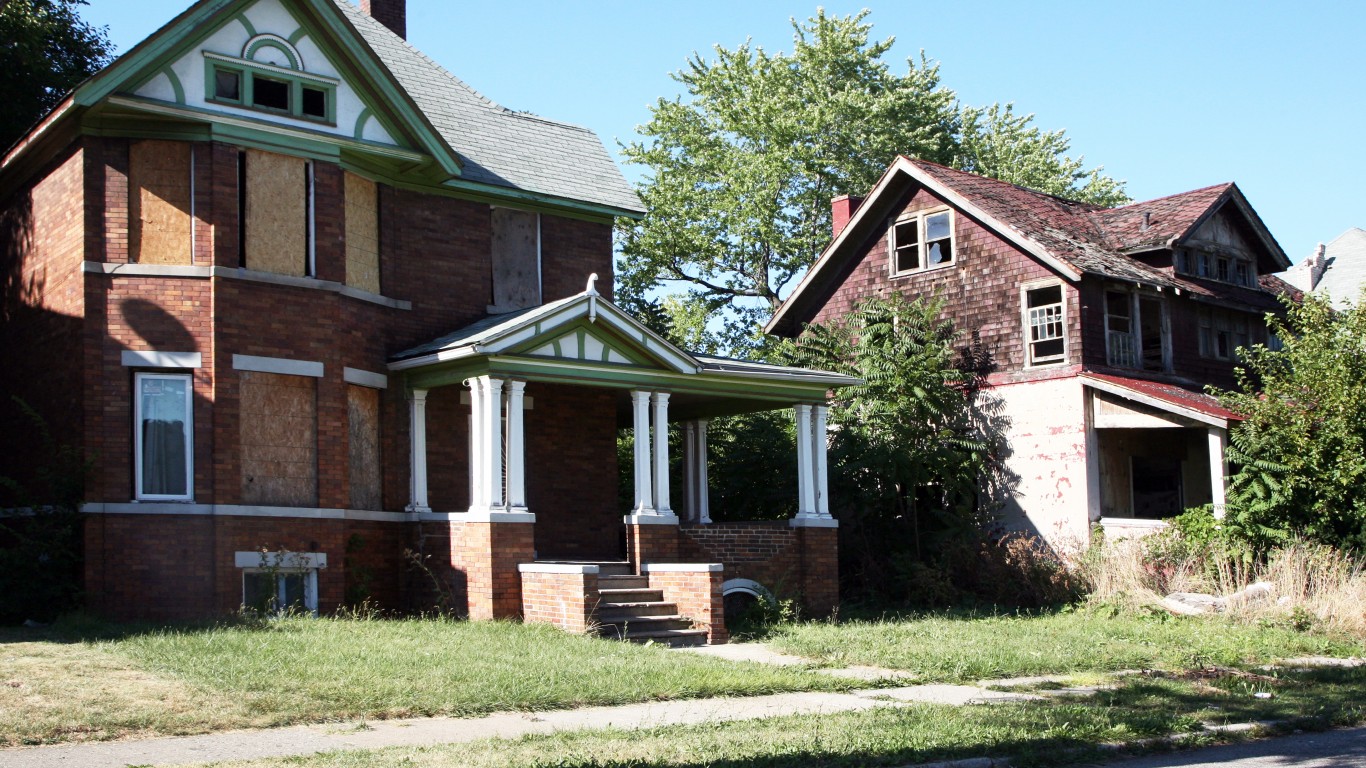
Michigan: 1.1 million
Detroit’s population has been decimated by the declining manufacturing industry, and Census estimates show the city’s population has declined from about 1.8 million in 1950 to less than 700,000 today, about a 1.1 million people decline.
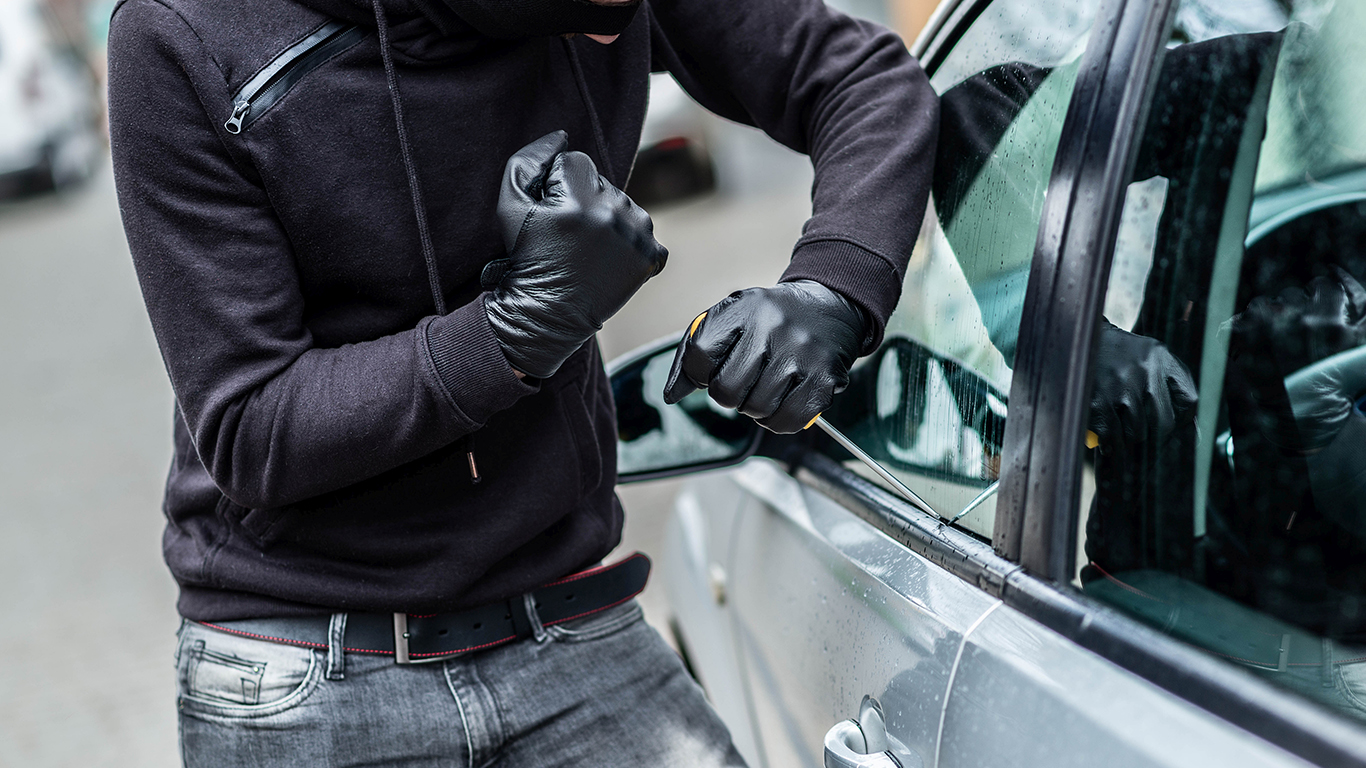
Minnesota: +2.7%
Though the property crime rate is declining nationwide, it is increasing in Minnesota, up 2.7% from 2016 to 2017. Minnesota is one of the few states where both larceny and car theft rates increased over that period.
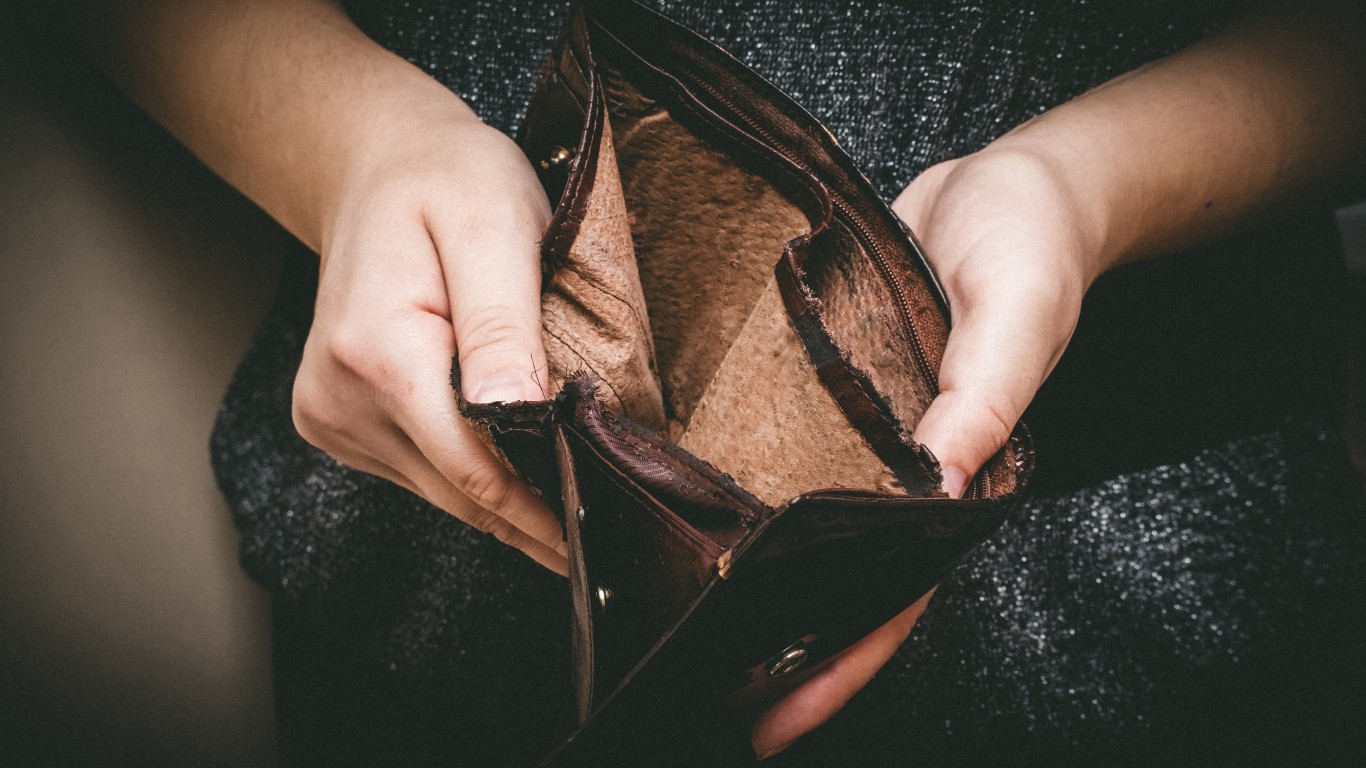
Mississippi: 19.8%
Nearly one out of every five Mississippi residents lives in poverty, the highest poverty rate in the country and well above the national poverty rate of 13.4%.
[in-text-ad-2]
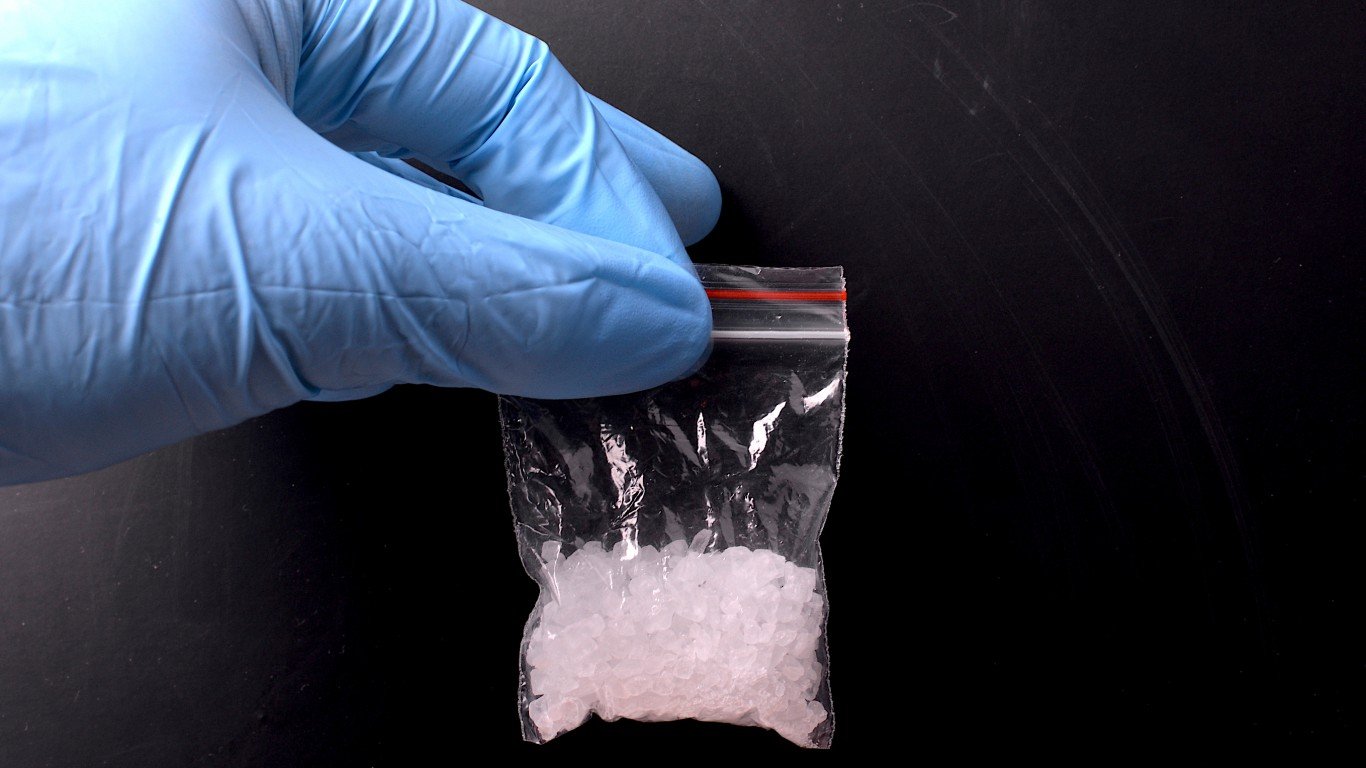
Missouri: 1,825
There were 1,825 meth lab busts in Missouri in 2012, hundreds more than the state with the next highest amount of busts.
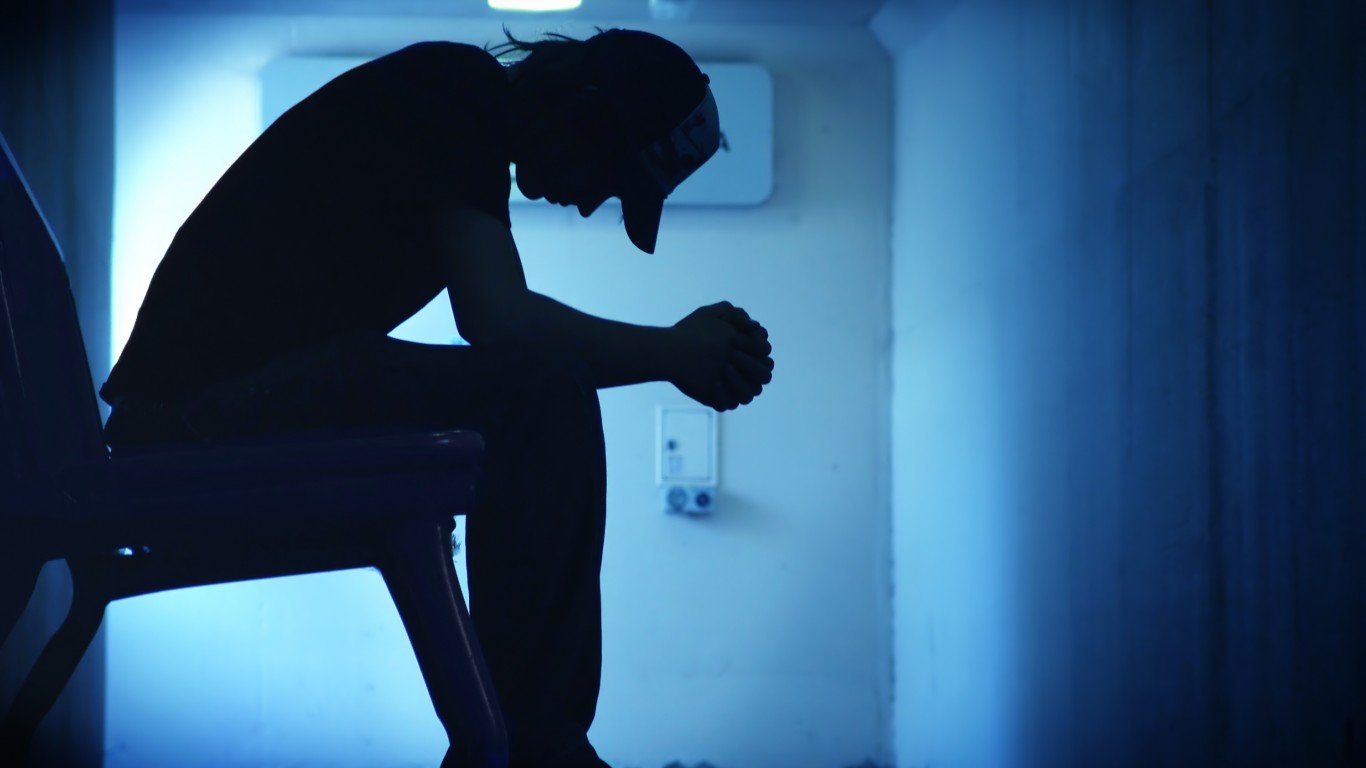
Montana: 26 per 100,000
Montana has the highest suicide rate of any state, at 26.0 incidents per 100,000 residents.
[in-text-ad]
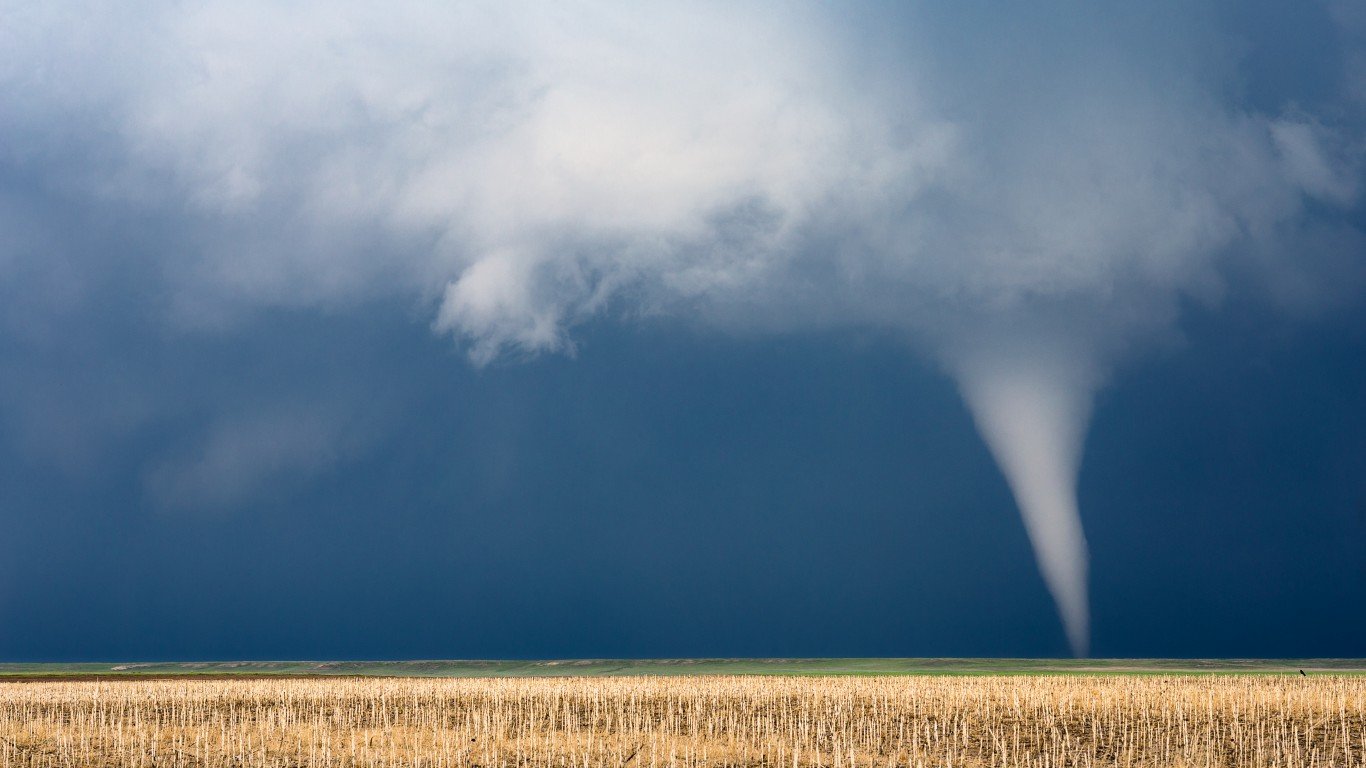
Nebraska: 2,636 since 1950
Like much of the Midwest, Nebraska has many tornadoes. The state has been hit by 2,636 tornadoes since 1950s.
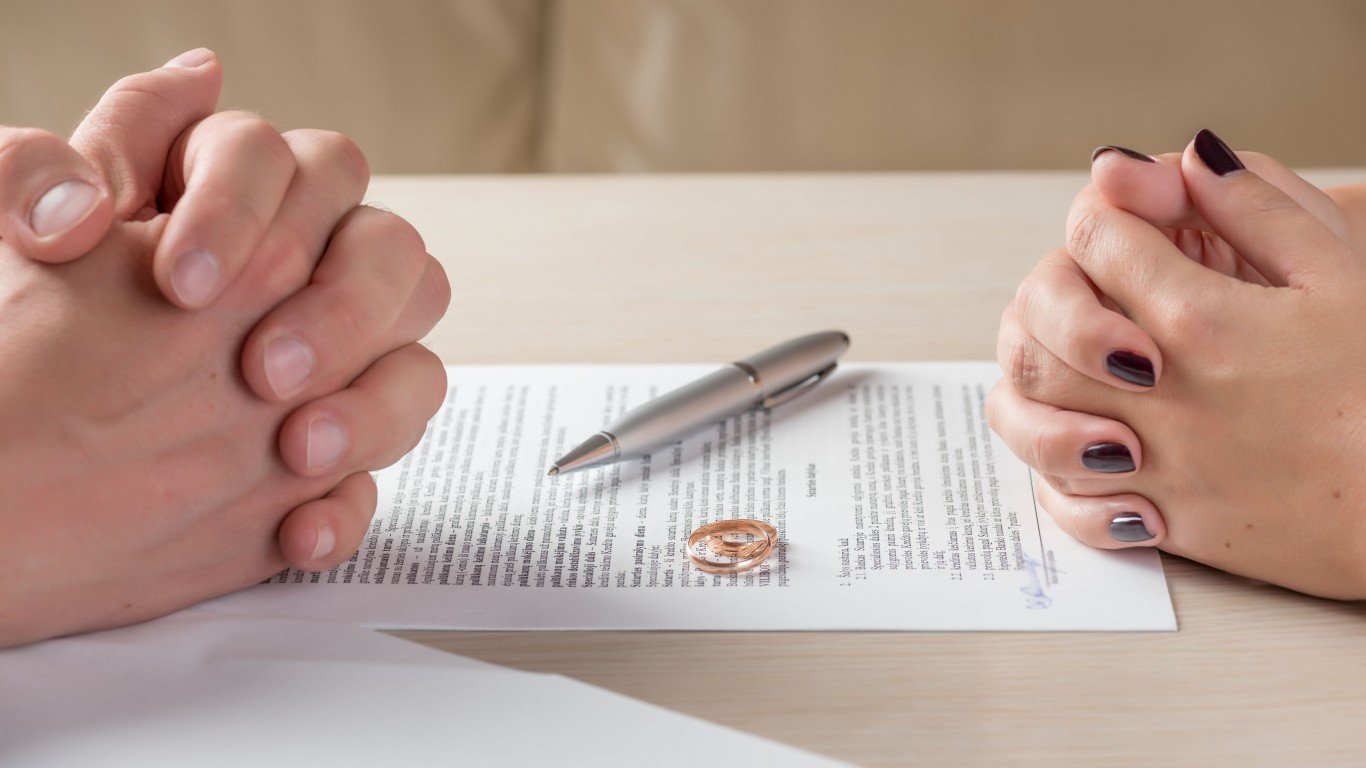
Nevada: 4.5 per 100,000
As you may expect from the state that is home to Las Vegas, Nevada has the highest rate of divorce. For every 100,000 residents in Nevada, 4.5 got a divorce in 2017.

New Hampshire: 35.8 per 100,000
The opioid epidemic has hit many parts of the country, but almost none were hit harder than New Hampshire. The state had 35.8 opioid overdose deaths per 100,000 residents in 2016, second to West Virginia
[in-text-ad-2]

New Jersey: 99.8% of population
New Jersey is one of the least environmentally friendly states as nearly all state residents live in high ozone areas — high ozone in the air we breathe can be harmful to health.
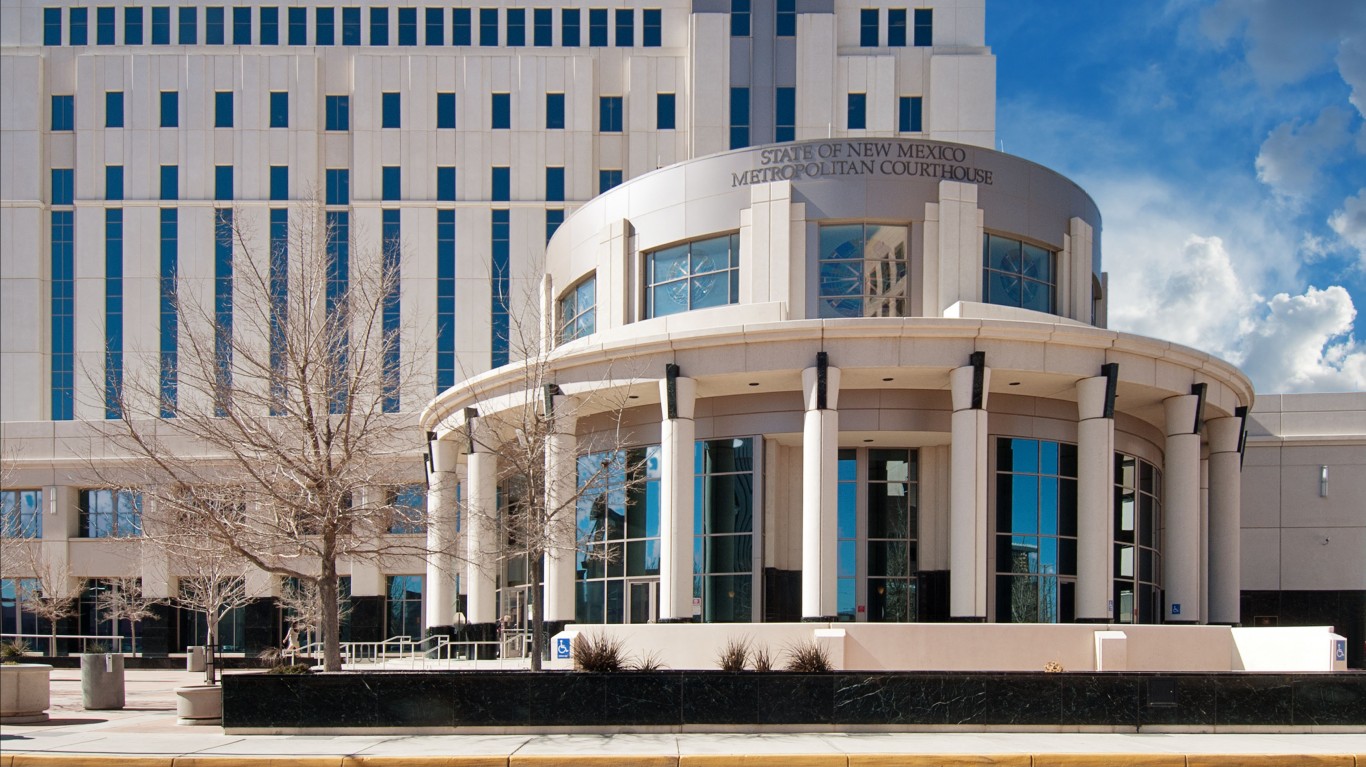
New Mexico: 3,942 per 100,000
There were 3,942 property crimes — which include burglary, larceny, and motor vehicle theft — for every 100,000 people in New Mexico in 2017, the highest property crime rate of any state. The national property crime rate is 2,392 per 100,000 people.
[in-text-ad]
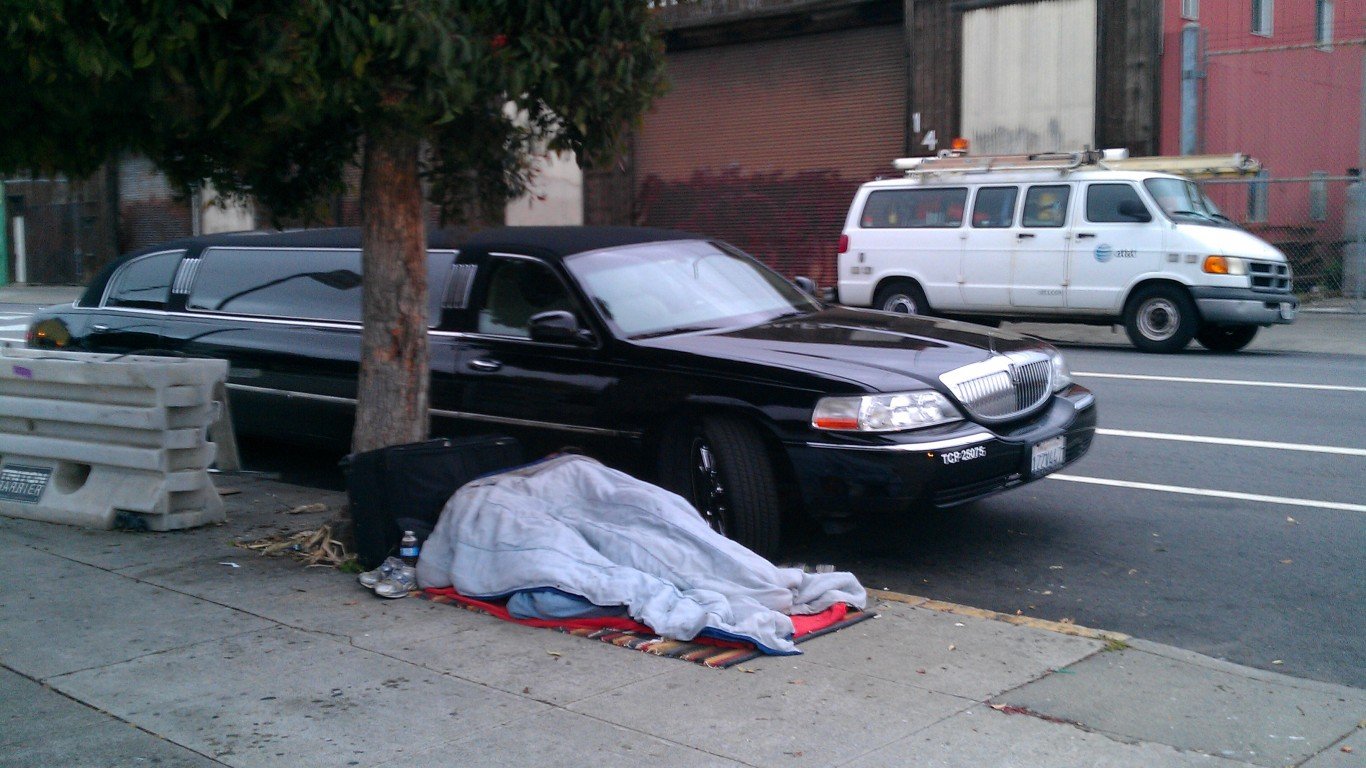
New York: 5.7 times
The income of the top 20% of earners in New York is at least 5.7 times higher than the income of those in the bottom 20%, the worst income inequality of any state.
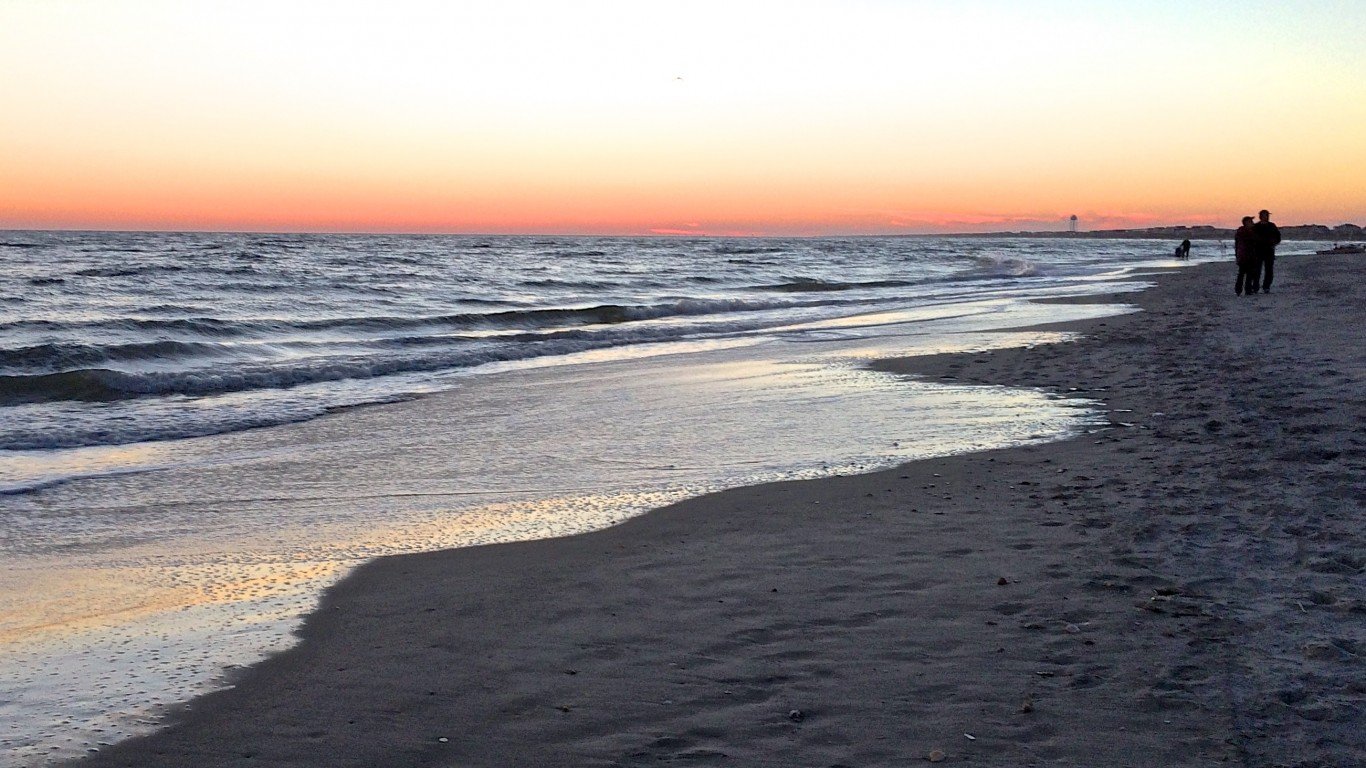
North Carolina: $223 million
North Carolina has over 300 miles of coastline and is especially susceptible to damage from sea-level rise. By some estimates, rising sea levels could cost $223 million per year by 2080 in southern North Carolina alone.
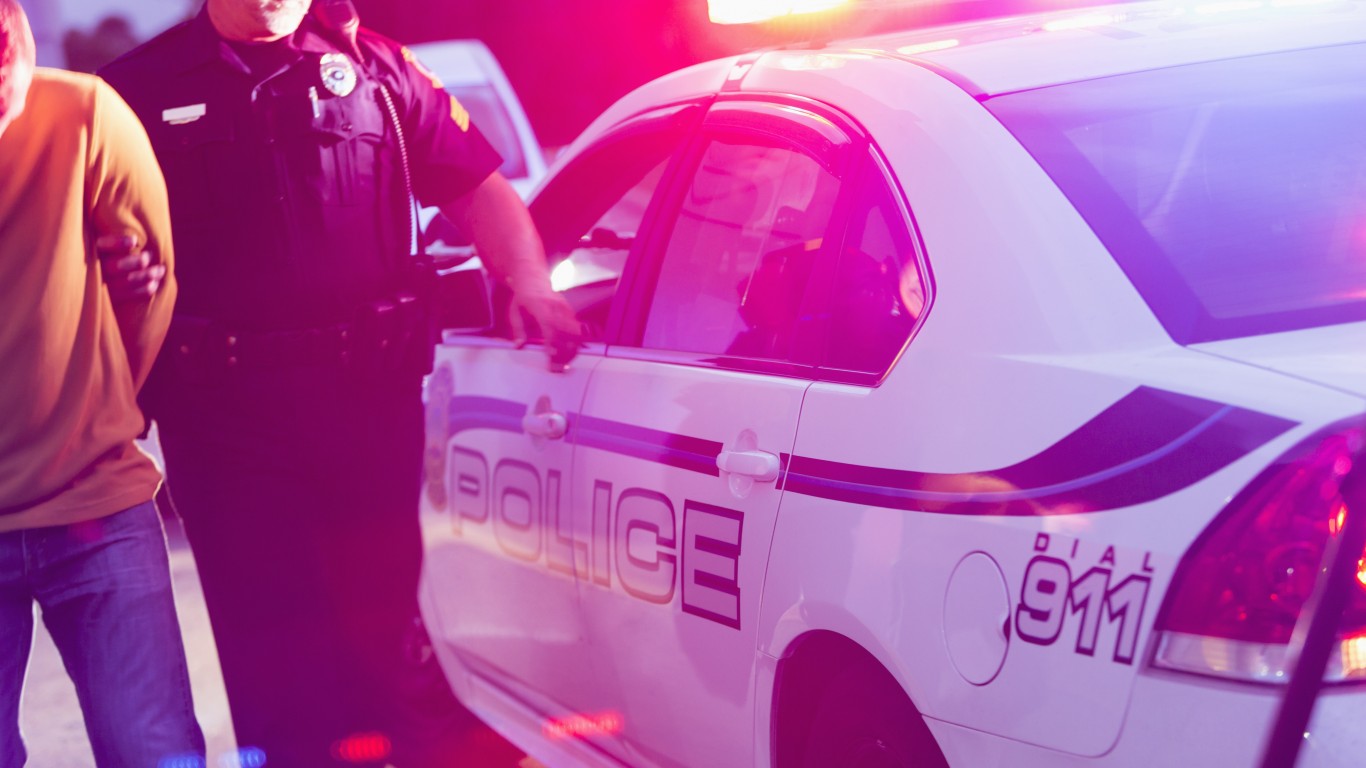
North Dakota: 48.1%
In North Dakota, 48.1% of driving deaths involve alcohol, the largest share of any state. Nationwide, just 30% of driving deaths are related to alcohol.
[in-text-ad-2]
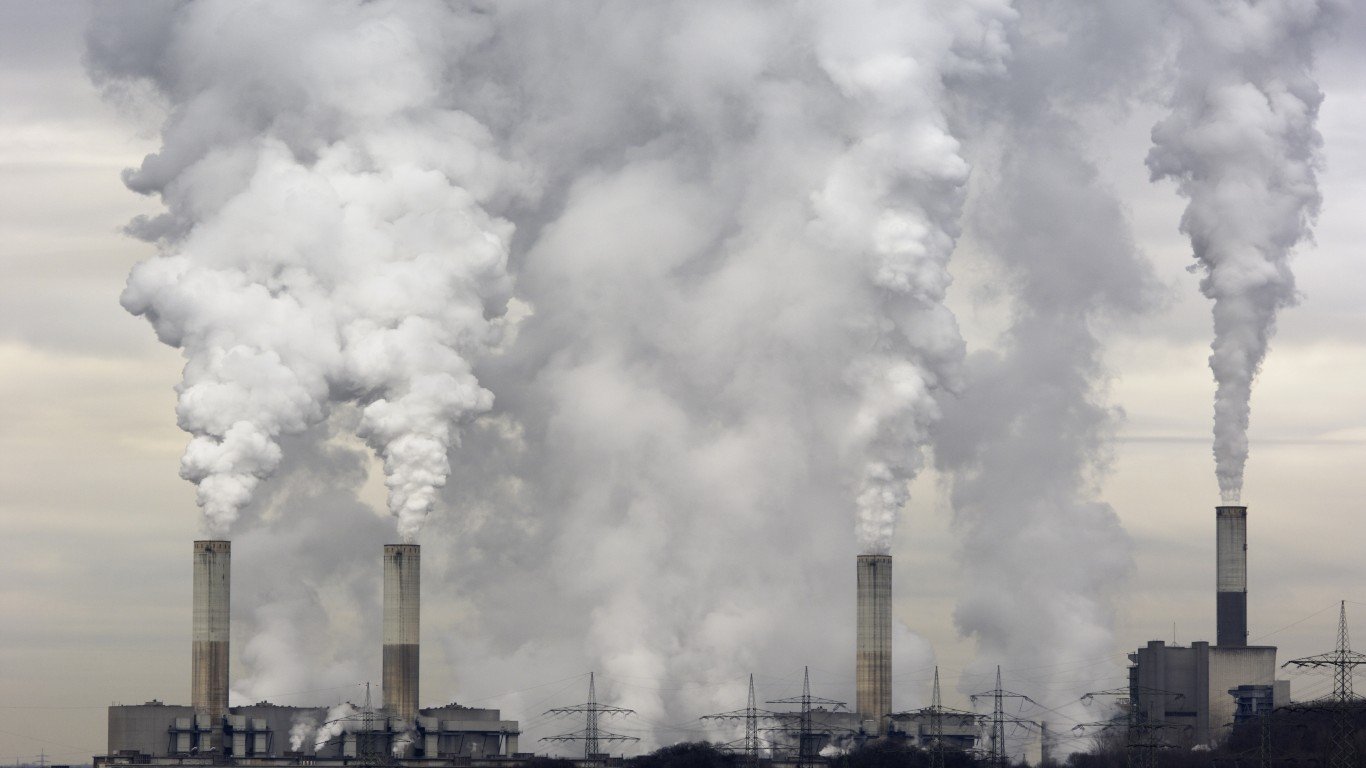
Ohio: 11.3 ug/m3
Air pollution is a problem in Ohio. The average daily concentration of PM2.5, harmful inhalable particulate matter, is 11.3 micrograms per cubic meter, the highest concentration of any state.
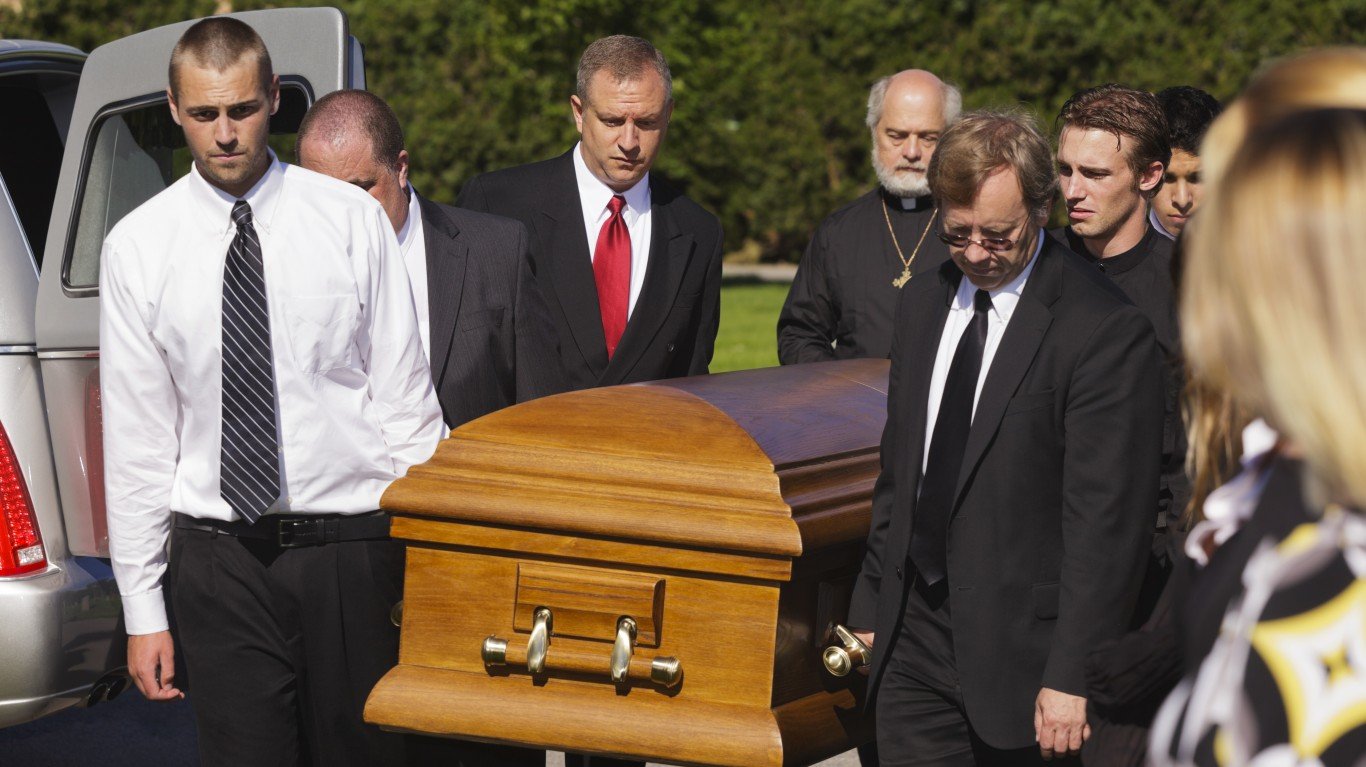
Oklahoma: 3.4 years
Between 1980 and and 2014, life expectancy at birth improved by only 3.4 years in Oklahoma, the smallest improvement of any state and less than half the 7.2 year national increase.
[in-text-ad]

Oregon: 6.38%
Abuse of pain relievers is an ongoing problem in the United States, and 6.38% of Oregon’s residents 12 and up abuse them, the highest share of any state. Oregon is one of six states where more than one in 10 18-25 year olds abuse painkillers.
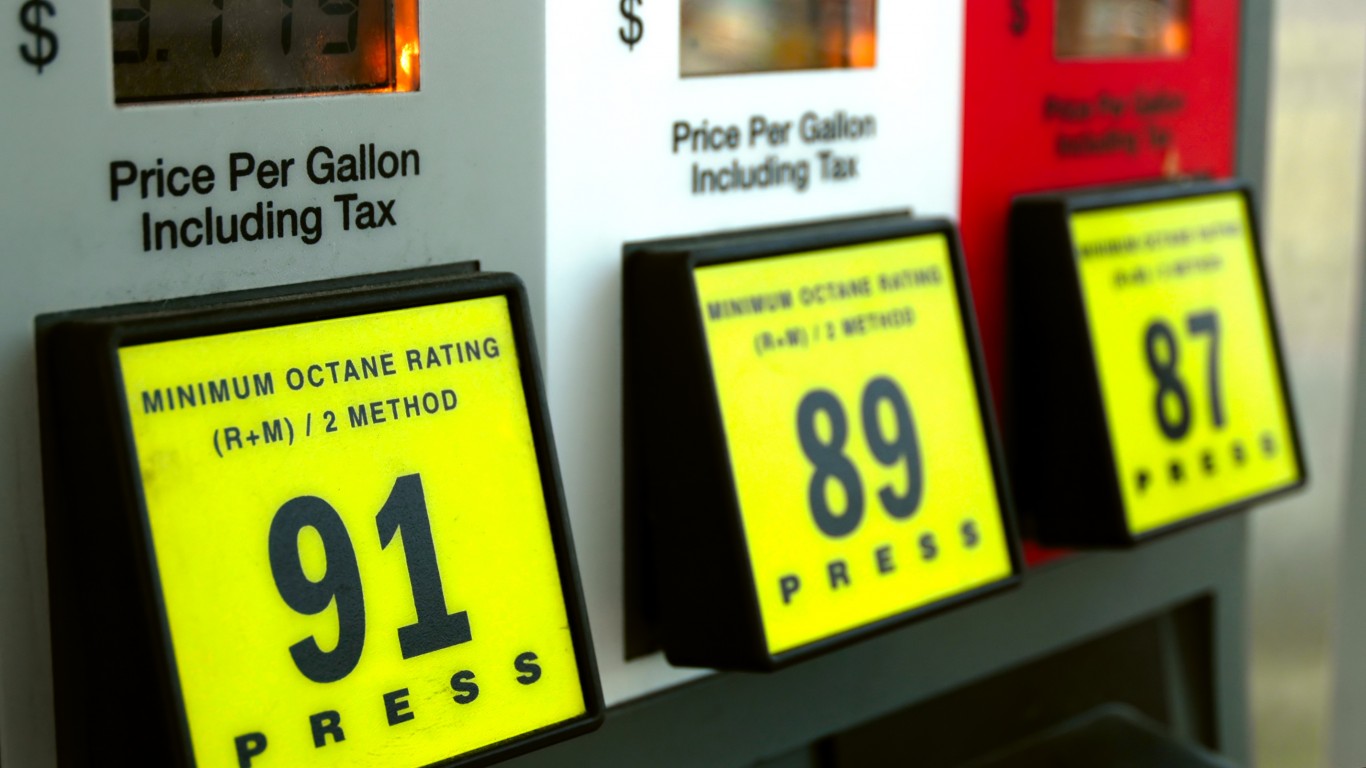
Pennsylvania: 58.7 cents
Pennsylvania gas tax of 58.7 cents per gallon is the highest in the country.
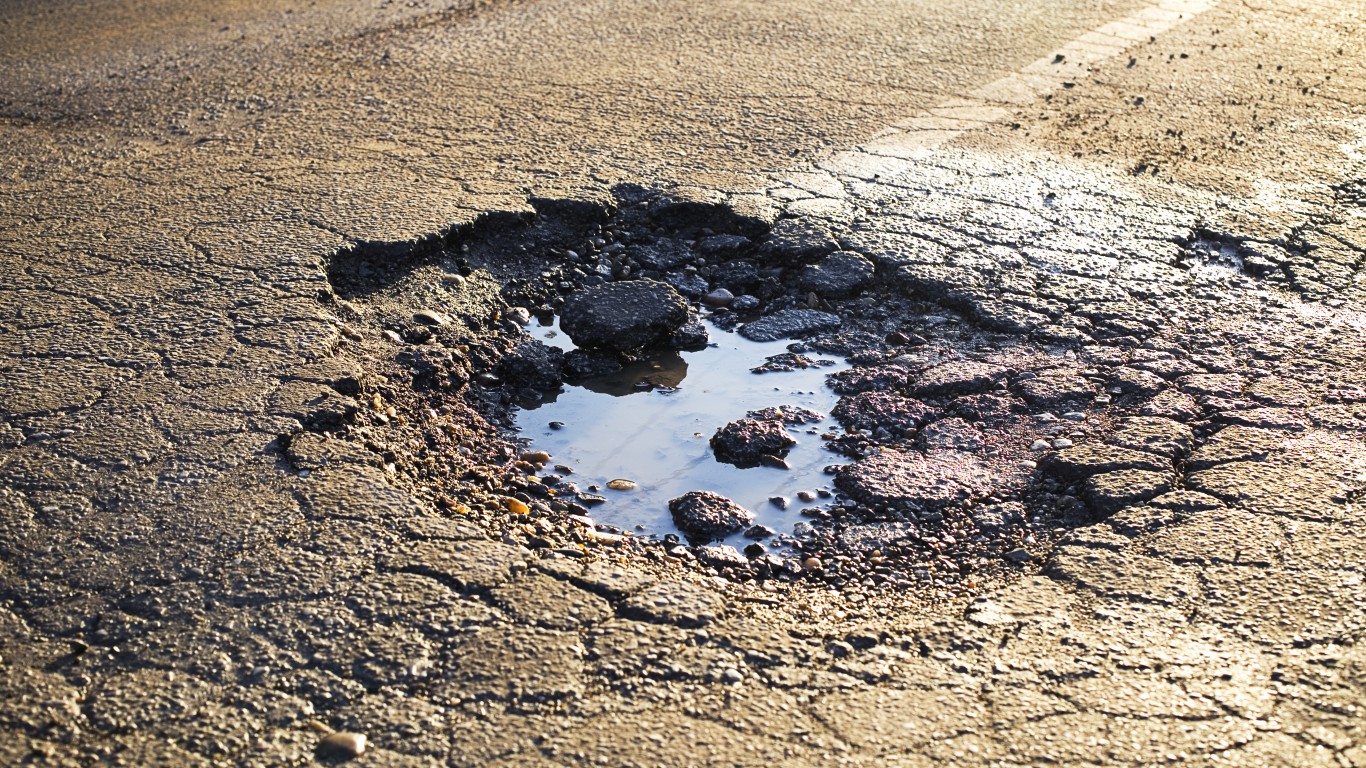
Rhode Island: 39.7%
An estimated 39.7% of public roadway in Rhode Island is in poor condition, the largest share of any state and more than triple the 11.2% share of roadway nationwide.
[in-text-ad-2]
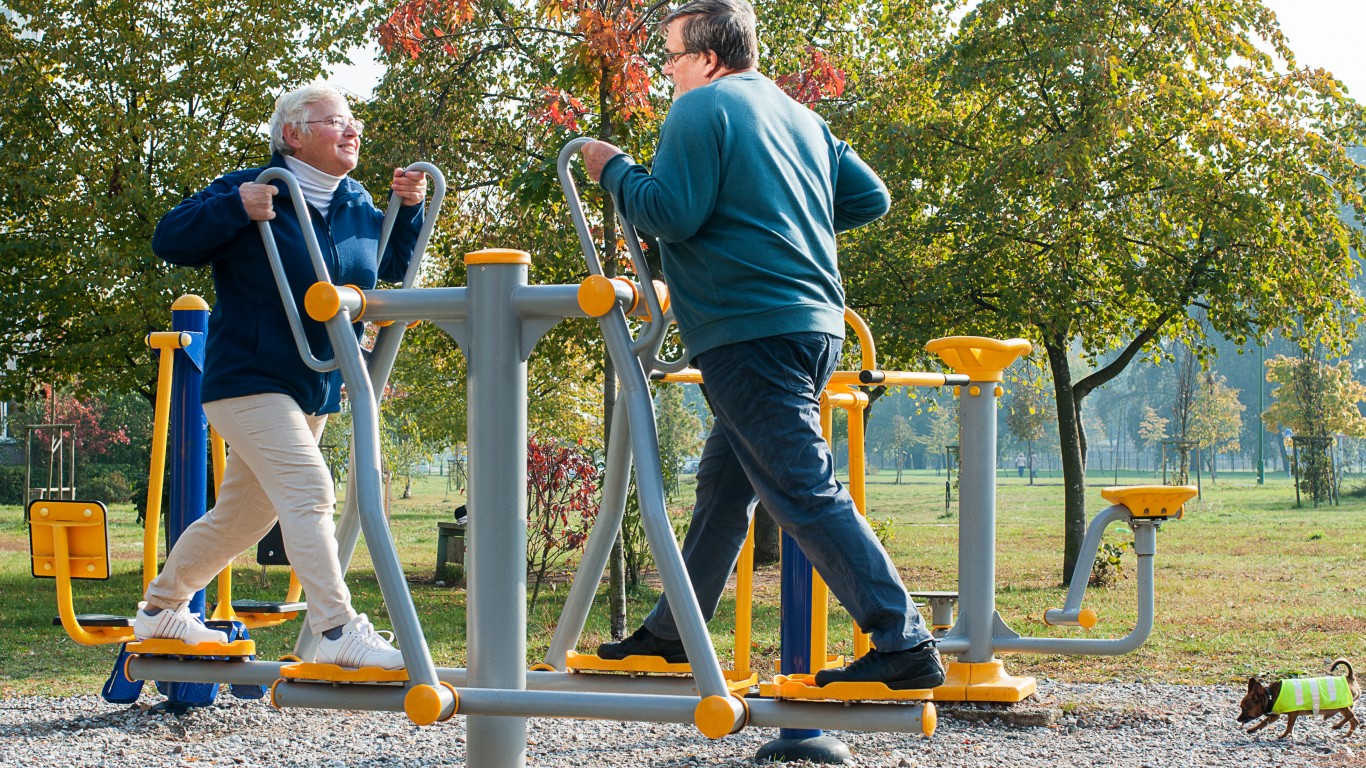
South Carolina: 54.2%
Just 54.2% of South Carolina residents have access to places for physical activity like park parks and recreation centers, the smallest share of any state.

South Dakota: $1,022 per capita
The South Dakota state government spent just $1,022 per capita on health in the most recent fiscal year, the lowest of any U.S. state. State spending on health nationwide came to $1,884 per capita. New Mexico spends over three times as much as South Dakota on health per capita.
[in-text-ad]
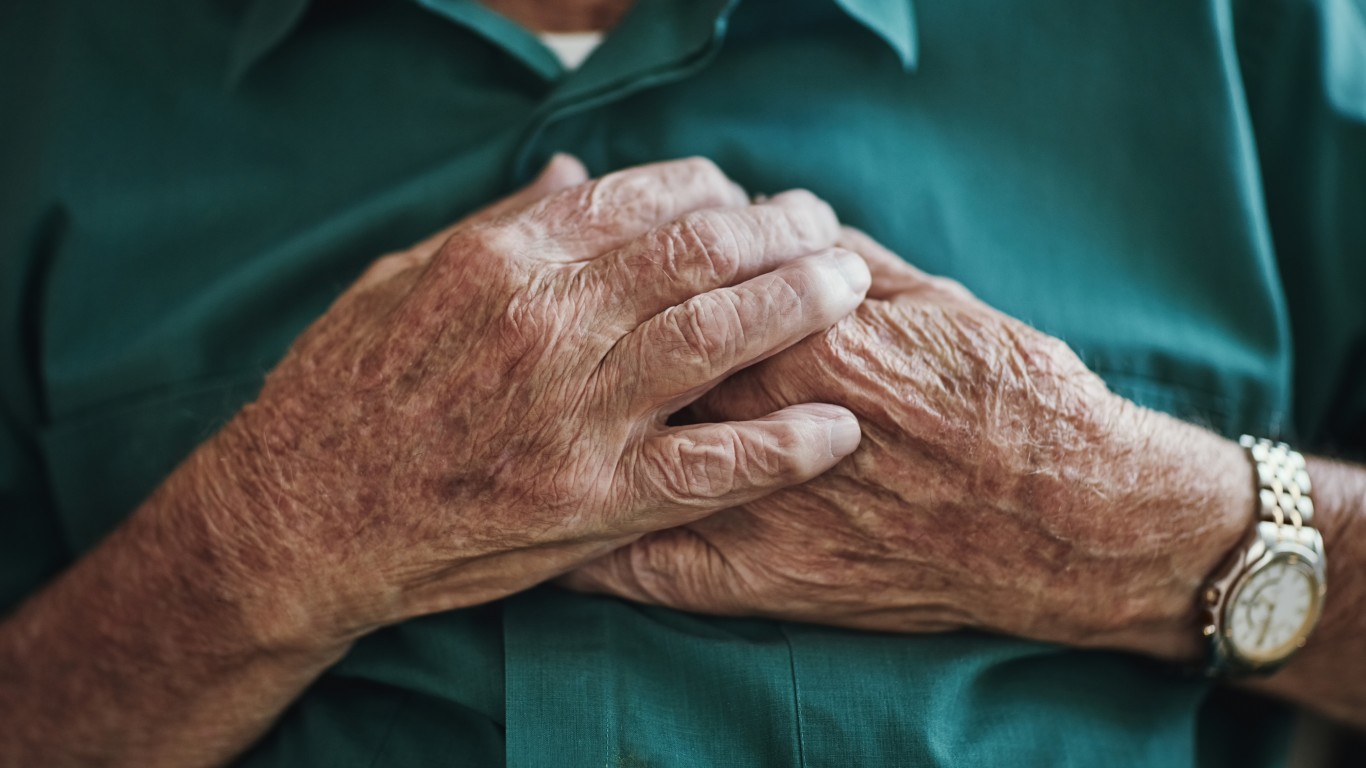
Tennessee: 9.8%
According to the CDC, 9.8% of Tennessee adults have a major cardiovascular disease of some kind, compared to the national prevalence of 6.9%.
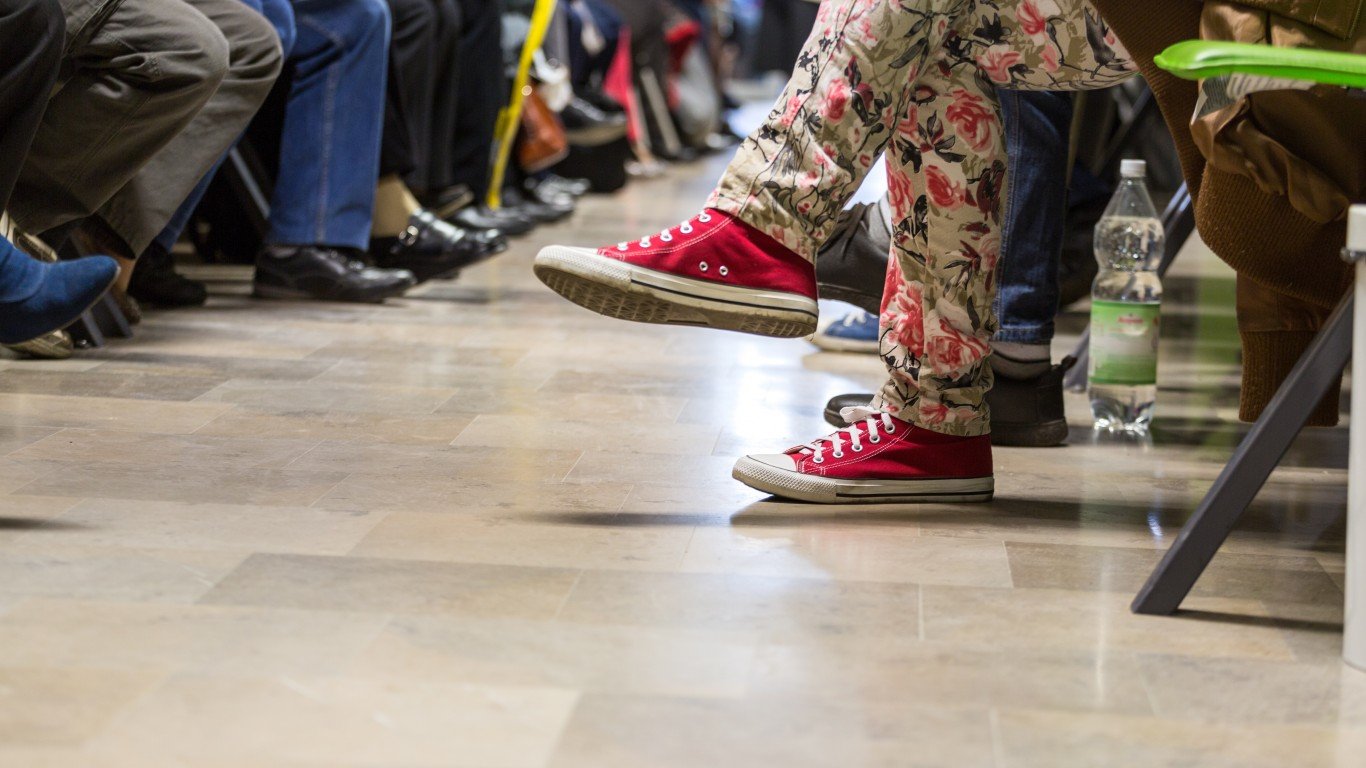
Texas: 17.3%
In Texas, 17.3% of the population lacks health insurance, the highest uninsured rate of any state.
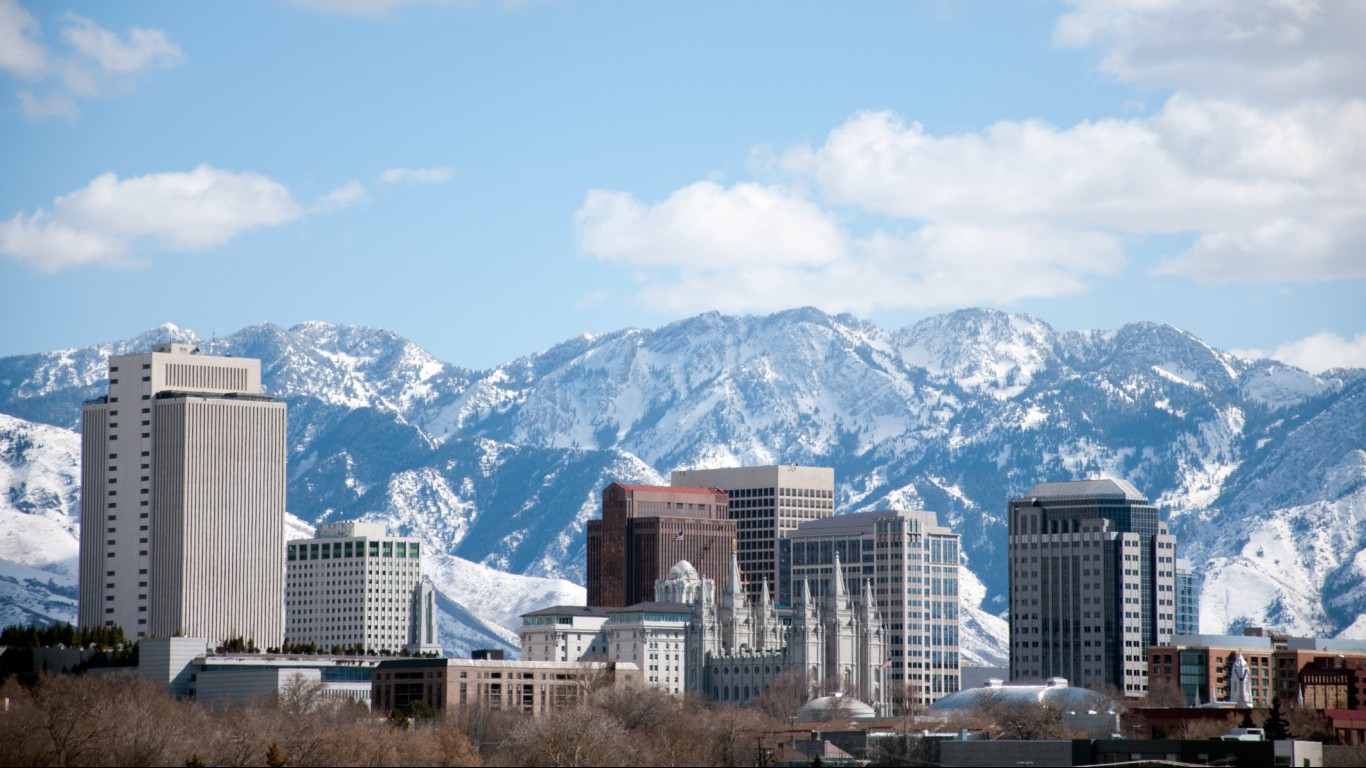
Utah: 3.5 per 10,000 people
Social associations like golf clubs, fitness centers, religious organizations, and others provide social support networks — and there are only 3.5 social associations for every 10,000 people in Utah, the least of any state.
[in-text-ad-2]
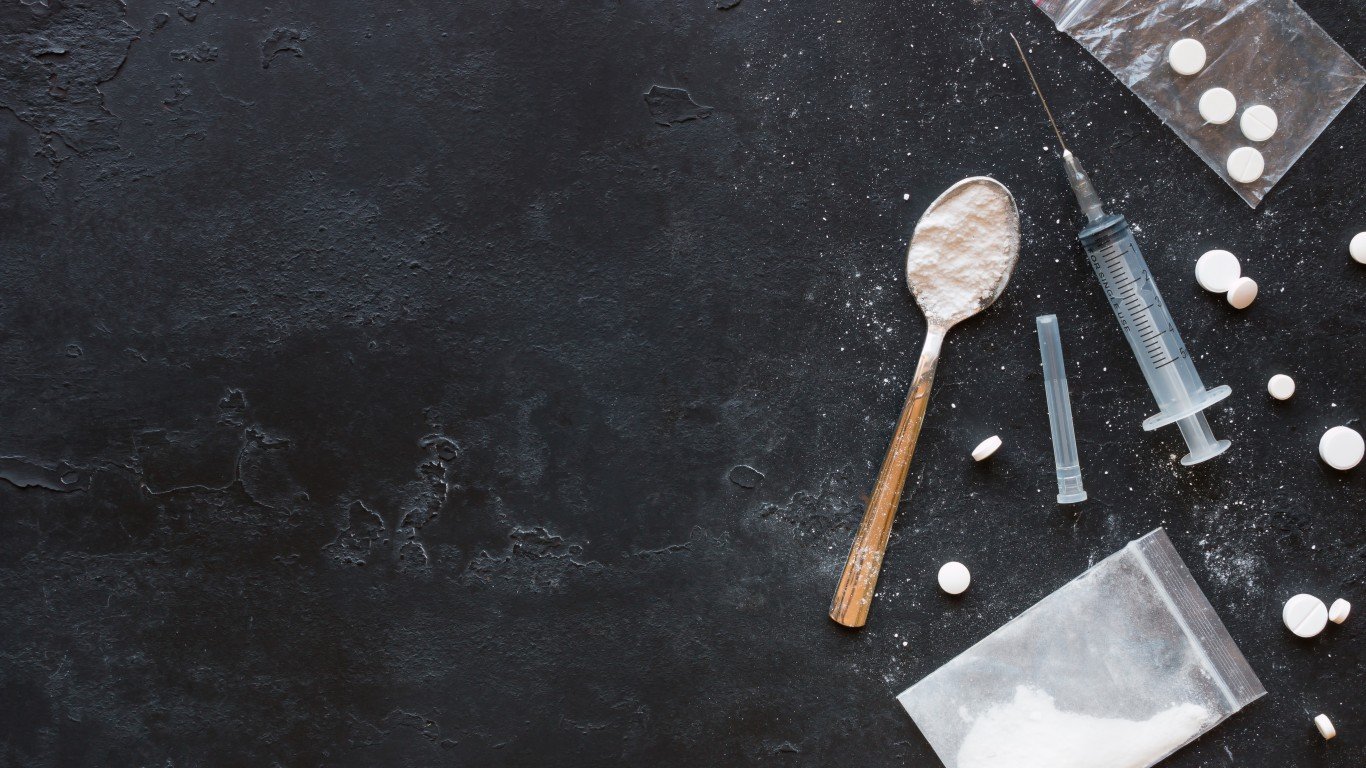
Vermont: 45.3%
According to the Substance Abuse and Mental Health Services Administration, 45.3% of Vermont’s 18-25 year olds report using drugs in the past month, by far the highest share of any state. Less than 25% of young adults across the country report substance abuse.

Virginia: $9,120
Between cards issued by both banks and retailers, Virginians have an average of $9,120 in credit card debt, the most of any state in the contiguous United States.
[in-text-ad]
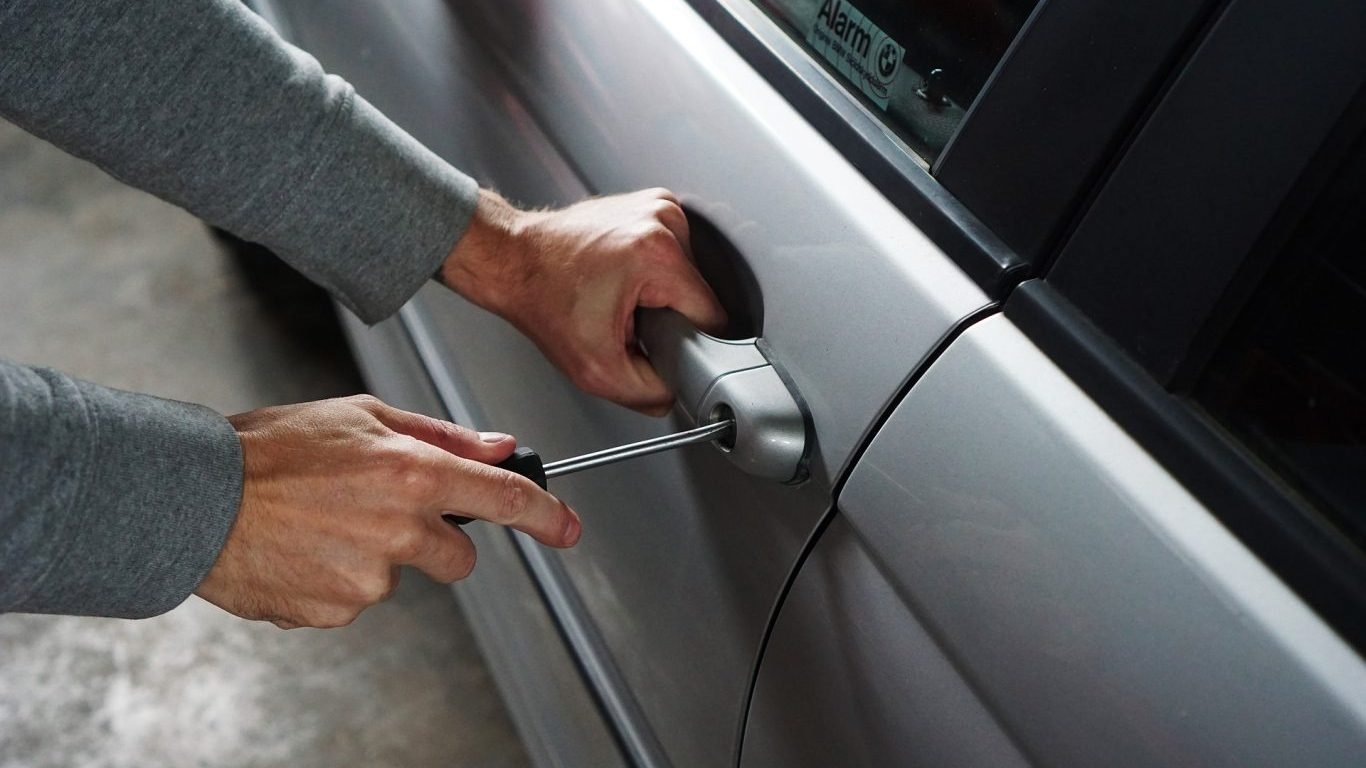
Washington: 28,796
Washington had among the most car thefts in 2017, with 28,796 reported incidents. This trails only the far more populous states of Texas, California, and Florida.
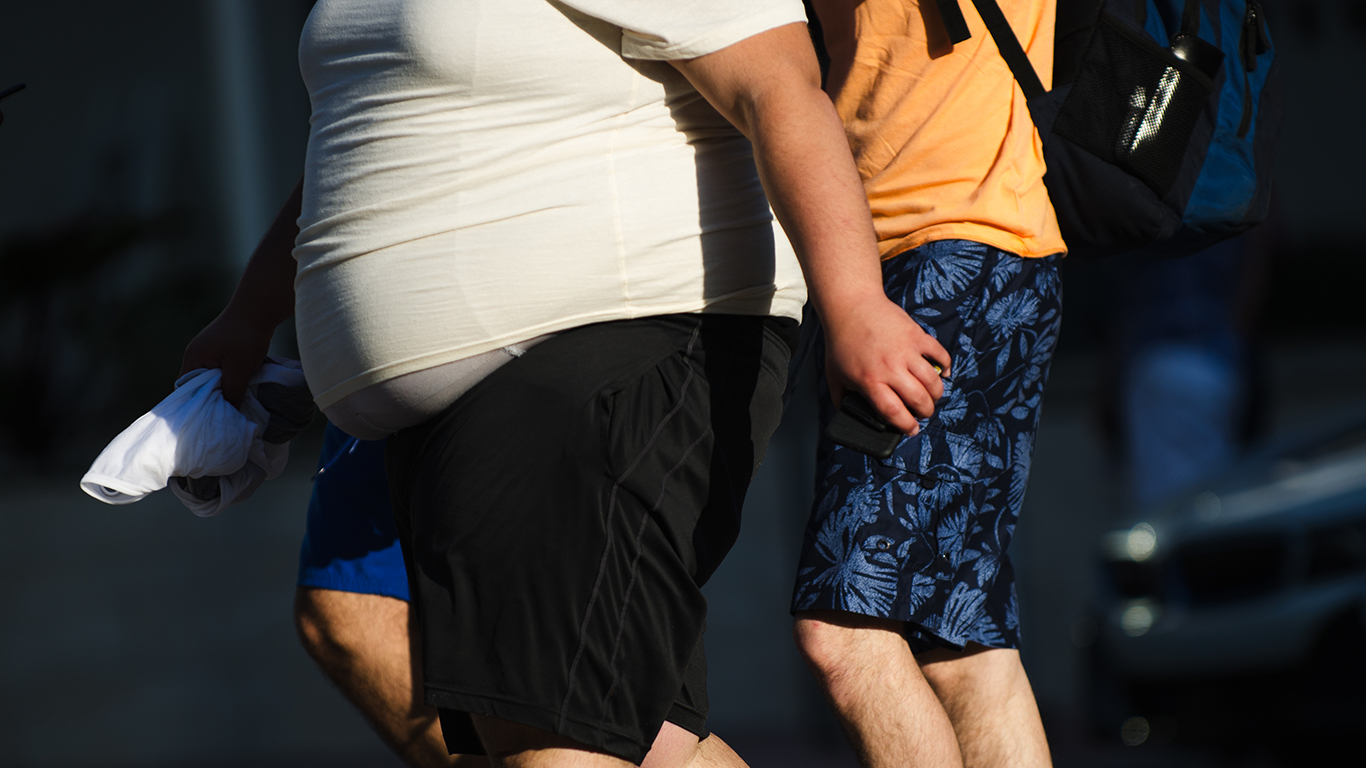
West Virginia: 35.5%
West Virginia’s 35.5% adult obesity rate is the highest of any state. The national obesity rate is 28.0%.
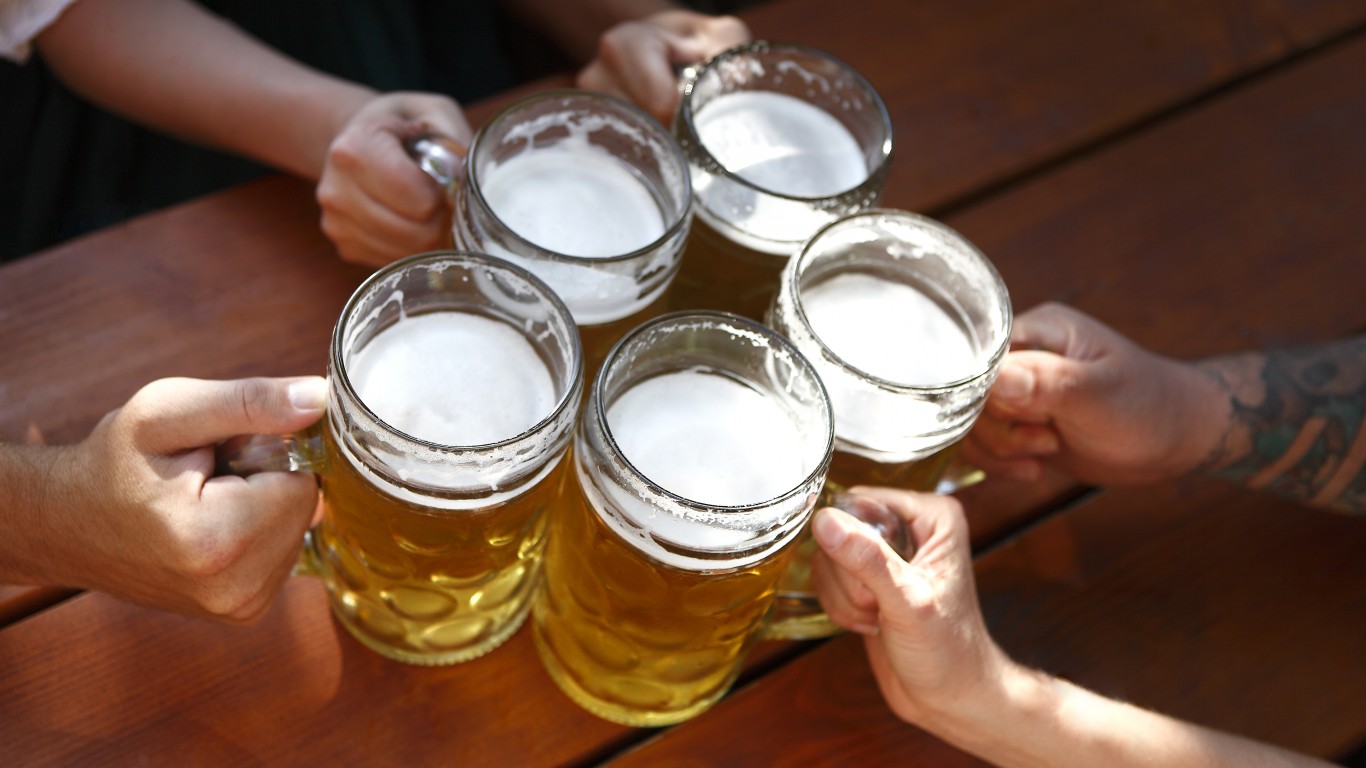
Wisconsin: 26.2%
An estimated 26.2% of adults in Wisconsin report drinking excessively, the largest share of any state. The national rate of drinking to excess is 18.0%.
[in-text-ad-2]

Wyoming: -0.62%
Over the last five years, total employment in Wyoming has fallen by an average of 0.62% per year, the steepest such decline of any state.
Sponsored: Attention Savvy Investors: Speak to 3 Financial Experts – FREE
Ever wanted an extra set of eyes on an investment you’re considering? Now you can speak with up to 3 financial experts in your area for FREE. By simply
clicking here you can begin to match with financial professionals who can help guide you through the financial decisions you’re making. And the best part? The first conversation with them is free.
Click here to match with up to 3 financial pros who would be excited to help you make financial decisions.
Thank you for reading! Have some feedback for us?
Contact the 24/7 Wall St. editorial team.
 24/7 Wall St.
24/7 Wall St.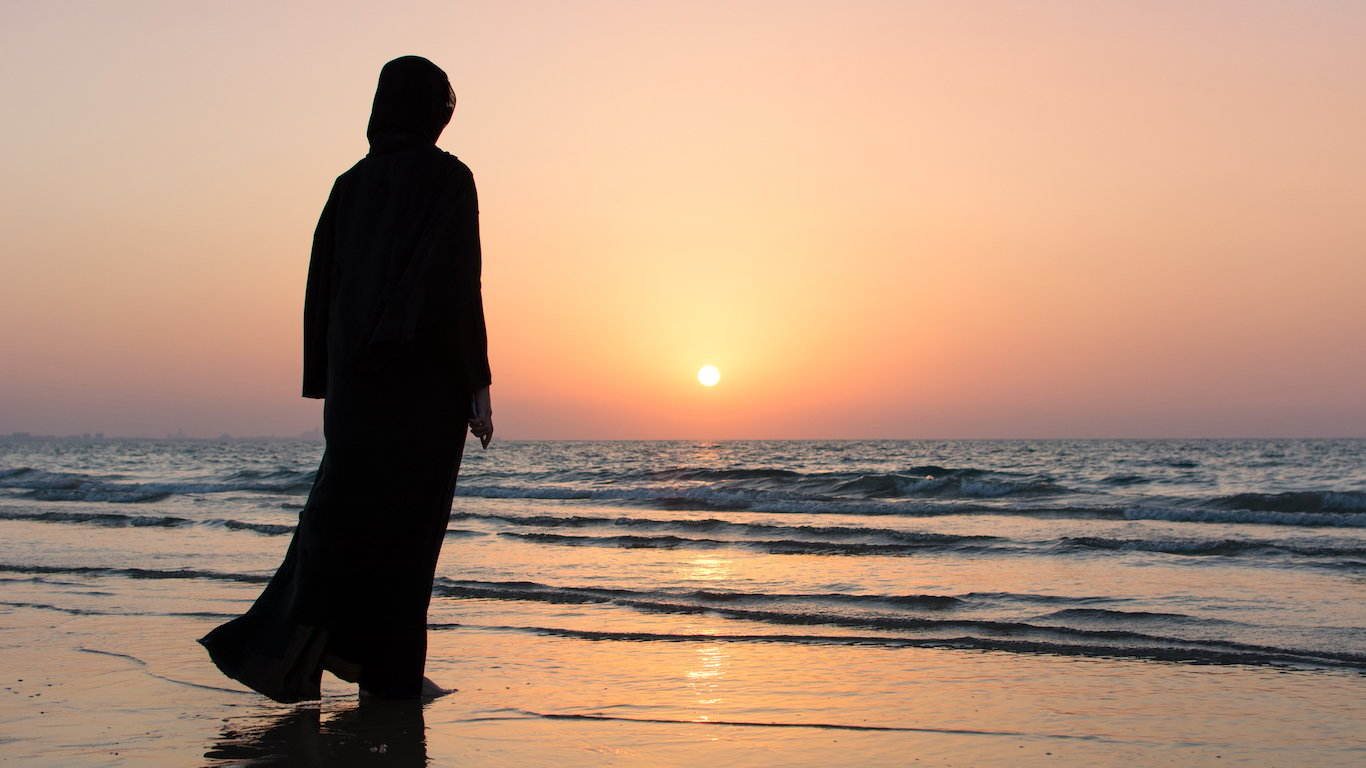 24/7 Wall St.
24/7 Wall St. 24/7 Wall St.
24/7 Wall St. 24/7 Wall St.
24/7 Wall St.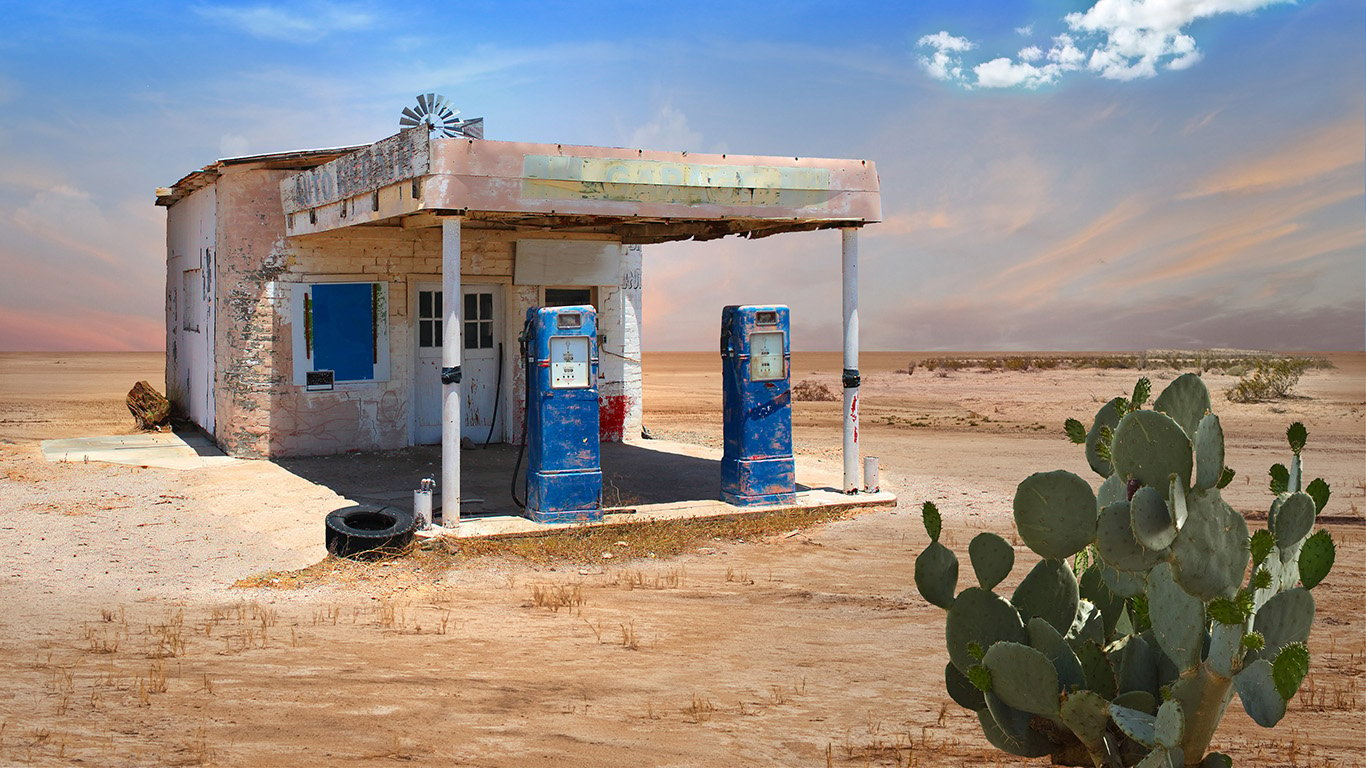 24/7 Wall St.
24/7 Wall St. 24/7 Wall St.
24/7 Wall St.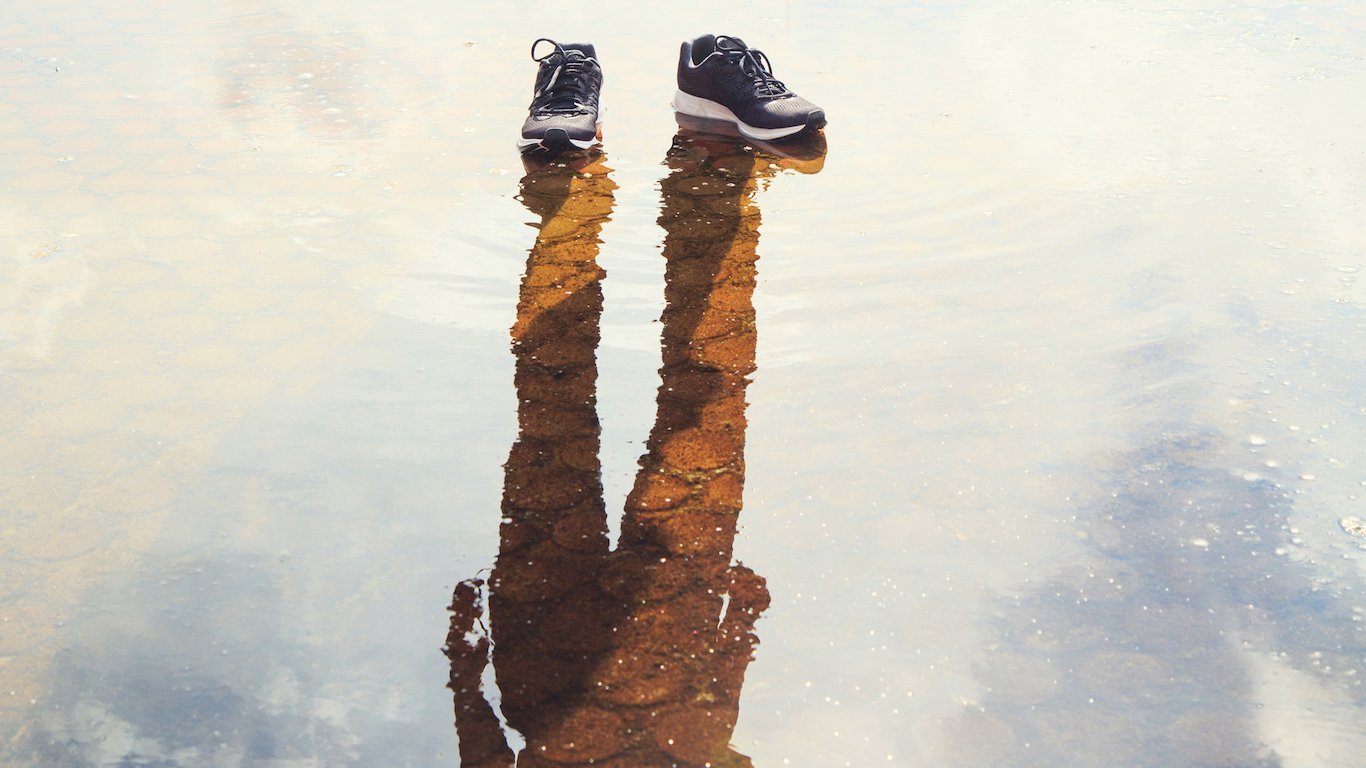 24/7 Wall St.
24/7 Wall St.
